S2: Episode 3
The Pendulum
Big game hunters in town for a convention go to the Wild Orchid looking to let loose. But city police have other plans, marking Reno’s latest swing from permissiveness to restrictiveness.
Episode | Transcript
The Pendulum
Robin Amer: Hey everyone. I know that you know this by now, but just to remind you: because this season of The City is about strip clubs, it’s not gonna be suitable for everybody, especially kids. And this episode in particular has a lot of very explicit conversations about sex.
OK, here’s the show.
Production team member: Previously on The City...
Velma: “To all Ponderosa hotel tenants: Unfortunately I must relay some bad, very bad news to you.”
Kamy: It's sad that you're wasting city of Reno resources on this, on bringing private investigators in to look at boobs. That's all it is. Yeah, there's boobs.
Anjeanette Damon: I just discovered that Karl Hall owned an office building pretty much across the street from the Wild Orchid and he just sold it in March for like $1.1 million dollars.
Mark Thierman: Wow. That bastard. OK.
Kamy Keshmiri: My dad's like, “Well, you learn to fight back.”
Velma Shoals: This has been a home for my granddaughter since elementary school and we don't want that taken from us. Please don't take that from us.
Thierman: Fuck 'em. They wanted to see what war is, we’ll show ‘em what war is.
Robin Amer: To really understand Reno’s present day strip club battle—why Reno has suddenly put the squeeze on its clubs and why Kamy Keshmiri is fighting back so hard—we have to go back in time.
Because this fight actually stretches back more than a decade.
It’s a frigid Thursday night in Reno, back in January of 2007. But inside the Wild Orchid, dancers are warming up for a big night.
For years, Safari Club International has held its annual convention in Reno.These are big game hunters—hundreds of them. During the day, they talk about their latest trophy kills. And at night, they head downtown for some fun.
Tawny: Like, we couldn't wait for Safari Night. Every table is full, standing room only, all five stages going, and you have money and you can make it all night long.
Robin Amer: That’s Tawny. Back in 2007, she was one of the Wild Orchid’s top-earning dancers—an “A-list” girl who loved to party and knew how to hustle for money.
Tawny was looking forward to work that night. But when she arrived at the club, the door girl had a warning.
Tawny: She looked at me and said, “You don't want to be here.” And I go, “What are you talking about? It's Safari Nights.” She goes, “The cops are here. Street enforcement’s here.”
Robin Amer: But Tawny wasn’t going to let that stop her.
Tawny: And I, I remember this to this day. This is my exact words to her. I go, “But I don't have anything to worry about.” I said, “I have my licensing and I have my I.D. and I don't do drugs.”
Robin Amer: But as it turns out, she did have something to worry about.
The club’s lawyer, Mark Thierman, was also there that night. Here’s how he remembers it:
Mark Thierman: The SWAT team shows up at 9 o’clock in their black Kevlar outfits—I'm sitting there, I'm at the bar, I'm sitting there—and their sun visor helmets, and batons, and shotguns, in the middle of Safari Week!
Robin Amer: Pretty much since it became a city, Reno has swung on this pendulum. At one end, Reno embraces vice and the economic bounty it can bring. Then it starts to recoil at its own seedy image, and the pendulum swings the other way.
Back in January 2007, the city was cracking down. Case in point: Police officers in full tactical gear raiding the Wild Orchid on one of the busiest nights of the year.
Today, Reno is at a similar crossroads, trying to decide if it wants to continue embracing vice or let the new economy put it to rest for good.
I’m Robin Amer and from USA TODAY, this is The City.
Act 1
Robin Amer: So, before the break, we talked about this pendulum in Reno that swings between permissiveness on one hand and restrictiveness on the other. In some ways, those swings correspond with economic boom and bust cycles.
When the economy is bad, vice tends to thrive, because when the city is desperate, it tends to be more lenient. And when the economy starts to turn around, the city faces a choice: lean toward respectability or double down on vice.
To get into the strip club business in the first place, the Keshmiri family had to time these shifting winds just right.
Here’s our reporter, Anjeanette Damon.
Anjeanette Damon: In 1992, Kamy Keshmiri was in a bad place. His soaring athletic career had come crashing down when he tested positive for steroids a month before he was set to compete in the Olympics.
But right away, he started looking for that next opportunity. He told me about it during one of our interviews in the back room of the Ponderosa Hotel.
Kamy Keshmiri: So I figured, if I can be the number one in the world in discus, what could I do in business?
Anjeanette Damon: His younger brother, Jamy, was just getting out of college.
Jamy Keshmiri: And my father's like, “Look, OK, what are these guys gonna do?” You know, we didn't get degrees as doctors and lawyers, and we, I think, we generally wanted to be like him. We wanted to be businessmen, you know?
Anjeanette Damon: At the time, their dad owned what was then the Ponderosa Hotel and Casino. But the casino was struggling.
Las Vegas had long since eclipsed Reno. And while the city’s bigger hotel casinos were doing just fine, smaller ones were closing left and right as casino gambling spread to other parts of the country.
Kamy Keshmiri: These buildings are becoming dinosaurs. Everybody's abandoning, alright? The Pioneer. Remember the Pioneer, next door? Gone. Kings Inn, gone. All these properties just evaporating.
Anjeanette Damon: The Keshmiris figured, if they couldn’t make a go of the casino, why not use the space for something else entirely?
Kamy Keshmiri: And so, I came to my dad and I said, “Look, nightclubs—we have all this parking. We’re right here.”
Anjeanette Damon: In 1994, they opened their new club and called it Discopolus—named after the classic Greek statue Discobolus. The statue depicts a muscular young discus thrower in the wind up position, ready to let loose his throw. The club was decorated with a replica of the statue.
That replica is still around, sitting deep in the basement of the strip club. It bears a strong resemblance to Kamy, actually.
With the help of some publicity gimmicks, like wet T-shirt and bikini contests, Discopolus flourished, drawing people to an otherwise dark stretch of downtown. And for the most part, the city council let the Keshmiri family do its thing. But that wouldn’t last.
This is how Reno tends to operate: sanctioning debauchery one minute, then restricting it the next.
It’s actually been happening since Reno was just a dusty Wild West outpost in a state people mostly traveled through on their way to get somewhere else.
Reno sprung up in the 1860s as a rough and tumble supply town for nearby silver mines. Brothels, bars, and gambling halls peppered the streets. But then the silver mines went bust, and the town almost did too.
Over the next couple of decades, Reno struggled with its identity. It found success in agriculture and broke ground for the state’s first university. But it held on to that rough-and-tumble character and was never quite willing to give up its brothels and gambling.
Then, in the early 20th century, it found a new vice to embrace: divorce.
Back then, getting divorced was not only scandalous, it was hard to do—except in Nevada. In no other state could you get a divorce as quickly. So people looking to end their marriages flocked to Reno from around the country, especially people with means.
Reno became synonymous with quickie divorces, and Hollywood movies of the era would often cast Reno as a dusty backdrop for a character looking to end her marriage, like Marilyn Monroe in The Misfits, or Pauline Moore in the 1938 film Charlie Chan in Reno. Here's Moore on screen chatting with a Reno cab driver.
Cab driver: This your first trip here?
Moore: Yes.
Cab driver: I thought you looked strange. Some of ‘em come so often I was thinking of printing up commuter tickets! [Laughs, then sees she doesn’t think it’s funny.] Oh well. I guess divorce ain’t much more than a matter of traveling. You check out of the state of matrimony and land in the state of Nevada! I ain’t got no complaints though. Owe my living to divorces, same as most of the people in this town. And by gosh, it’s the one business that even the Depression don’t hit!
Anjeanette Damon: In the ‘30s and ‘40s, more brothels and casinos sprung up to entertain those wealthy soon-to-be divorcees.
Narrator: This is a city of glitter and glamour, a city of neon and bright lights, of spinning wheels and dancing feet. This is Reno, the biggest little city in the world!
Anjeanette Damon: Over time, Reno found that making legal what other states made illegal was a really easy way to boost its economy.
Now, strip clubs aren’t typically illegal, even in other cities. But in the 1990s, they sure fit in well with the overall adult party scene that thrived in Reno.
In 1995, the Discopolus nightclub was prospering. But Kamy’s dad was getting nervous. Those wet T-shirt contests were getting a little wild sometimes, and tops would come off completely.
So the family sought a cabaret license from the Reno City Council. Even though the license would allow them to open a strip club, they assured the council they had no plans to go full-on topless.
During that meeting, one councilwoman wanted to know if the Keshmiris would have any male strippers. So Kamy offered to perform for her in a G-string. It was a little too much for the councilwoman, who ran out of the chambers covering her face with a handkerchief.
Kamy got his topless cabaret license that day. It turned out to be just in time.
Topless bars were popping up all over the place and that made police nervous. They worried that the clubs would attract drugs and prostitution.
Within months of granting that cabaret license to the Keshmiris, the council issued a temporary ban on new strip clubs.
But despite the family’s promise to the council, Kamy and Jamy did have their eye on the strip club business.
Here’s Jamy:
Jamy Keshmiri: We knew the strip club revolution’s coming. We saw how well they were doing, and we had a license. We’re like, we need to take advantage of this now.
Anjeanette Damon: So they remodeled Discopolus and opened it as the Wild Orchid strip club, even though the city had a ban on new strip clubs in place.
The city attorney told an indignant city council it could do nothing to stop it, because the Keshmiris already had that license. Once you grant a right, he said, you can’t take it away.
The Keshmiris had cemented their prime downtown location, and thanks to the moratorium, they had a competitive advantage—the city wasn’t going to let any other strip clubs open up downtown.
For years, the Wild Orchid thrived as part of downtown Reno’s party scene. Dancers made buckets of cash—and so did the Keshmiris.
The city checked in from time to time, making sure dancers had their licenses and work cards. But for the most part, the city stayed out of their way. Until 2007.
An off-duty cop happened to be hanging out in the Wild Orchid one night. He later told his bosses that while he was there, a dancer propositioned him for sex. That’s when Reno PD began hatching a plan.
This brings us back to that frigid night in the winter of 2007 when the big game hunters were in town.
Tawny, the A-team stripper, is on her way into work at the Wild Orchid. Lawyer Mark Thierman is sitting at the bar.
An undercover cop walks into the club. He pays his cover fee and sits at a table. A dancer approaches.He later reports she offers him oral sex in the back room for a thousand dollars.
Tawny wasn’t quite at work yet when this went down. But she knows that dancer.
Tawny: He basically led her into talking dirty to him at the table, just so she could get him into VIP.
Anjeanette Damon: Tawny says the young woman hadn’t been stripping for very long. She didn’t know how to play the game of staying just vague and sexy enough to get a guy into the VIP room without actually promising him sex. That’s the balancing act a stripper has to play to make decent money.
Tawny: But he led the conversation. She was on tape. So they constituted that as prostitution. She was handcuffed in front of everybody and dragged out, and she was one of our most classiest 19-year-olds studying to be a doctor. She didn't even fucking drink.
Anjeanette Damon: When the cop lands that alleged deal for oral sex, it triggers a full on raid. A dozen officers waiting outside stream into the club.
Mark sees them rush in from his perch at the bar.
Mark Theirman: It was pretty scary, and they ran around. They had these big shotguns they carry, and they rounded up everybody and told all the dancers to go down into the locker room and wait.
Anjeanette Damon: What were the patrons doing?
Mark Theirman: They were leaving. [Laughs] I mean, as soon as this happened, they got out of there.
Anjeanette Damon: Downstairs, the cops start checking dancers’ IDs, making sure each one has a proper license and work card. It’s a task that’s usually carried out by a bureaucrat with a clipboard, not a cop with a shotgun.
Mark Thierman But they showed up with 13 SWAT officers in full riot gear, to, I guess check the licenses of half a dozen females who were wearing bathing suits and no visible signs of a weapon on them. I don't know. I mean, they had sharp nails.
Anjeanette Damon: This is about when Tawny shows up for work. She isn’t about to give up a lucrative night just because the police are here. She doesn’t know that they’d already scared most of the patrons.
On her way downstairs to the locker room, she passes several cops.
Tawny: I still thought it was weird that it was street enforcement. Like, why would the city of Reno waste all this money on their street enforcement police officers that could be out there taking care of gangs and drugs and all that kind of stuff and they’re in our strip club? [Laughs]
Anjeanette Damon: Tawny’s license is valid, so she’s not worried. Other dancers are a little more freaked out.
Tawny: It was funny because a few weeks later, we realized that a couple of the girls that had warrants that nobody knew had warrants had gotten in their lockers and had other girls lock them in their locker. And they stayed in their locker with it locked during the entire raid.
Anjeanette Damon: Oh my gosh! Oh my gosh!
Tawny:Yes! And the cops never found ‘em.
Anjeanette Damon: When she gets downstairs, Tawny finds the locker room full of male police officers, which is problematic. Men generally aren’t allowed in the locker room, even male staff members, so the dancers can get ready for work in peace.
Tawny starts getting ready anyway. She takes off her street clothes and rummages through her locker for the lingerie she wants to wear for the night.
Tawny: And the two male officers walked up to me and they go, “We need to get your I.D.” And I said, “You can get my I.D. after I put on my clothes.” And they said, “You can't touch your locker and you can't move.” And I go, “I am naked right now!”
Anjeanette Damon: Tawny says this was the most dehumanizing part of the raid. It’s one thing to perform topless for clients. It’s another to be stared at by cops while you’re trying to get dressed.
Tawny: They didn't have one female advocate for us, nor did they care to have it. They treated us like, “Oh you’re strippers, you take off your clothes for a living, so you're used to being naked, so you better be OK with this.”
Anjeanette Damon: The police department refused to talk to me about what happened that night. But I read all their affidavits about the raid. In the documents, they disputed some of the dancers’ versions of events. For instance, they said women were offered the opportunity to get dressed and were never gawked at.
But there’s something else you should know.
The day before the police raided the Wild Orchid, Mark Thierman had filed his first lawsuit against the city. Mark liked to hang out at the club and he’d become friends with Kamy.
Mark Thierman: He was complaining about how the police are basically hassling him, they’re shaking him down. They’re not asking for bribes, but they're, they're in there at weird hours asking for weird things, picking on him. And they are!
Anjeanette Damon: Basically, in the year before the raid, the police had been showing up at the Wild Orchid without a warrant, demanding access to all parts of the club to make sure it was following city code. Mark persuaded Kamy to fight back, filing a suit that claimed these warrantless searches were illegal.
Mark is convinced the Safari Night raid was straight up retaliation for that lawsuit.
Later, as that lawsuit wound its way through court, the police sergeant in charge of the operation said in an affidavit that the police department had no idea the lawsuit existed when they raided the club.
But the federal judge presiding over the case was not happy.
He called an emergency hearing and slammed the city for how the police conducted themselves. He demanded to know why the cops had raided a club on one of the busiest nights of the year, demeaned the women working there, and disrupted business. The judge even said that the local law the city relied on to send the cops in the club in the first place was likely unconstitutional.
In the end, the city agreed to rewrite that law and settled the lawsuit for $100,000 in taxpayer money. Five dancers caught up in the sting got $3,000 each, including Tawny. The rest of the money went to the Keshmiris.
After being chewed out by a federal judge, the Reno PD pretty much disappeared from the Wild Orchid altogether. No more license checks. No more undercover operations. They left the club alone.
The pendulum had swung back to permissiveness.
Robin Amer: The judge’s order wasn’t the only thing that prompted that pendulum swing. The economy crashed. And Nevada was one of the states hardest hit. Reno had been riding particularly high on the housing boom and it suffered deeply in the crash.
The Great Recession laid to waste entire Reno neighborhoods. People abandoned their houses. Builders up and left projects in the middle of construction. And the recession ravaged city government. With its tax base gutted and bigger problems to worry about, over the next decade the city pretty much forgot about the strip clubs.
But some people found opportunity in that crisis. When we come back, Anjeanette tells the story of the rise of Midtown—a story that might sound familiar to some of you, and one that explains how gentrification came calling on the Wild Orchid.
That’s after the break.
ACT 2
Robin Amer: After the 2007 financial collapse, the real estate market in Reno ground to a halt. The recession put big developers out of commission.
But that opened opportunities for others.
In Midtown, cheap rents beckoned to young artists and would-be small business owners. They started opening bars and restaurants, coffee houses and boutiques. In other words, the recession opened the door for a wave of gentrification in Midtown—something that was happening in a lot of American cities around that same time.
Here’s Anjeanette.
Anjeanette Damon: If you think you’ve got an idea of what Reno is—an idea reinforced by those late-night comics who love to call the town a dump—Midtown Reno might change your mind. Today, anyway.
It didn’t used to be such a thriving neighborhood. In fact, it was a pretty rough place.
To get an idea of what the neighborhood used to be like, we caught up with Clint Neuerberg at the craft beer store he owns there.
Clint’s relationship with this neighborhood goes back to before anyone even called it Midtown. When he was a teenager in the ‘90s, he remembers dodging drug addicts on his way to punk shows at a music venue called Delmar Station.
Clint Neuerburg: More than once I was at a show there, and someone either got shot, stabbed, or run over outside. Like, it wasn't an uncommon thing to leave there and there be cops everywhere.
Anjeanette Damon: When he later moved into the neighborhood, it was still a sketchy place to live or operate a business.
That began to change when a young artists’ co-op called the Holland Project opened up a small event space across from where Clint’s bottle shop now stands.
Clint Neuerburg: And I think that was a key part of it, was bringing young artists into this neighborhood.
Anjeanette Damon: This is the path gentrification seems to take in many American cities: When artists show up in a neighborhood, developers are never far behind.
Next door to the Holland Project, a guy named named Mark Trujillo opened a tiny coffee shop called the Hub in what used to be a brick two-car garage built in the ‘40s.
Clint Neuerburg: I remember when Mark started building that place, I’m like, “He's building a coffee shop there? Like, what, does he hate money? [Laugs] Like, that'll never work,” sort of thing. Yeah, smash cut to now, it's like he's got this coffee empire that all started in that garage, basically.
Anjeanette Damon: Soon the neighborhood was a thriving urban center, full of bars and restaurants. The building that housed Delmar Station, the sketchy concert hall from the ‘90s, became home to a cheese shop and a juice bar.
Of course, Midtown hasn’t lost all its grit.
Clint Neuerburg: There's still a lot of areas of Virginia Street where you have to walk around a porno theater to get to your Thai restaurant or funky hipster thrift store.
Anjeanette Damon: But that porn theater may not be there for long. Another wave of gentrification is cresting.
It’s a warm summer Saturday morning in Midtown. The sun is just barely above the mountains to the east. Some of the more dedicated bar hoppers from last night stagger out of a nearby bar. A homeless man wanders by. I’m meeting up with Joe Morino, owner of Nameless Coffee.
It’s not long before the place gets busy.
This tiny coffee shop used to be the Hub, the one in the two-car garage. Joe used to be a barista there before he bought the place.
Joe Marino: It was the only coffee shop of its quality. Yeah, so it's kind of like people didn't have a choice. But now it's different. Plenty of shops around the neighborhood, and they've got all kinds of different milk alternatives and sugar syrups and whipped creams, and I think they had coffee, too. [Laughs]
Anjeanette Damon: Over the years, it’s become a gathering place for the people who live and work in the neighborhood. There’s a violin maker, the owner of a pizzeria, scientists, writers, a second-hand jewelry shop owner, a guy who drives around town in an electric hearse—and me.
I always thought, if I write that novel, the characters would come from the people I met here while drinking coffee and playing chess with my son.
But today, Nameless is closing its doors. There are too many coffee shops around, not enough parking. Joe’s had enough.
So the regulars have gathered for a final early-morning toast, clinking their espresso cups in tribute to Joe.
Joe Marino: Cheers, everybody. Last, last go-around in the morning.
[Clinking espresso cups]
Customer: Hey, you've been a blessing to us. You get us up every morning.
Joe Marino: Likewise. You’ve been a blessing to me, too.
Anjeanette Damon: The second wave of gentrification is here, driven not by locals, but by big-name developers with deep pockets.
They’re bringing high-end wine bars and sushi burrito joints. Consumers from the suburbs are replacing the hipsters that helped places like Nameless Coffee thrive.
But as this wave moves across Midtown, the Wild Orchid is standing in its way.
This gentrifying neighborhood is New Reno’s crown jewel—a symbol of Reno’s transformation from tired casino town to vibrant modern city. A transformation fueled by a new high tech economy of Silicon Valley giants and start-ups alike.
Midtown is the first place Mike Kazmierski shows off to the tech bros coming to town looking for office space.
Mike is the former military commander turned economic development guy that we met in Episode 1. The one who hates strip clubs.
I wanted to hear the New Reno sales pitch for myself. So last spring I asked Mike to drive me around town as if I were one of his clients—a prospective business owner interested in moving to Reno.
Mike Kazmierski: Well, we've just crossed the river, and really most communities would kill to have a river run through it like this.
Anjeanette Damon: He brings along one of his staffers, Bryan McArdle. He’s young, clean cut. Used to own a hookah lounge in downtown, actually. He’s the guy that schmoozes tech clients.
Bryan McArdle: We're driving into Midtown, which is sort of the main street that leads into our downtown corridor. And over the last decade, it's sort of transitioned to be the foodie, cultural, artsy section of downtown.
Anjeanette Damon: We approach the Wild Orchid and the six-story Ponderosa Hotel that rises behind it.
Near the street sits is a cluster of residents smoking and chatting, The digital sign is flashing “GIRLS GIRLS GIRLS.” There are weeds growing in the planters at the front door. It turns out Mike actually skips this part of the tour when it’s a real client in the car.
Mike Kazmierski: The Wild Orchid, I will specifically not drive a client past the Wild Orchid’s sign, because I think it's an embarrassment to our community.
Anjeanette Damon: Bryan agrees.
Bryan McArdle: As you drive through Midtown, you see all this vibrancy—these new restaurants, new small businesses popping up, and this, that specific strip, it just stands out. It’s, like, such a sore thumb in the midst of everything that is changing.
Anjeanette Damon: The Reno that Mike and Bryan want people to see is full of bustling restaurants and breweries and tech start-ups and urban living. And we have all that. But not only that.
We next drive past the city’s only homeless shelter. It’s an overcrowded complex in an up-and-coming brewery district in the eastern part of downtown.
Do you drive your clients past the homeless shelter? I ask.
Bryan kind of dodges my question.
Bryan McArdle: Yeah, I don't say, I wouldn't say that we have a homelessness issue. I think it's more perception than reality.
Anjeanette Damon: Mike doesn’t correct him. But we are literally staring at a block filled with homeless people waiting to get into the shelter for a meal or a shower or a bed.
Perception versus reality. In many ways, that’s Mike’s whole fight.
Robin Amer: As that tension between perception and reality continues to drive the fight over Reno’s strip clubs, the city council is once again asked to weigh in on the clubs and what they mean for the city’s image.
This time, though, it looks as if things might go well for Kamy. But this meeting, and what happens after it, takes a surprising turn.
That’s after the break.
Act 3
Robin Amer: In this drawn-out fight over Reno’s strip clubs, the city council is clearly struggling with how far to swing this pendulum between vice and respectability. And there are a few key meetings where this plays out.
The first we heard in Episode 1, when the council set the ball rolling on laws to kick the strip clubs out of downtown. And the second came seven months later, in April 2018.
Now, going into this meeting, Kamy Keshmiri is feeling pretty confident.
Here’s Anjeanette.
Anjeanette Damon: Ok, I’m back at Reno City Hall for another council meeting.
Mayor Hillary Schieve: Alright, Madam Clerk, back at ya.
Clerk: Madam Mayor, with that, we are on item J3—adult business regulations—
Mayor Hillary Schieve: OK!
Clerk: —and I do have public comment on this item.
Mayor Hillary Schieve: OK, fantastic.
Anjeanette Damon: The strip club issue is on the agenda for, like, a status check. But a lot has happened behind the scenes since that meeting seven months ago.
Most notably, Mark Thierman has filed another lawsuit, this time accusing the city of discriminating against female strippers.
This lawsuit is key.
It gave Kamy and Mark direct access to a pivotal Reno City councilwoman, Naomi Duerr. You see, parties to federal lawsuits are required to enter into settlement talks. And Naomi Duerr was appointed as one of the city’s mediators.
Kamy and Mark could talk with Councilwoman Duerr under the guise of mediating the lawsuit, all the while lobbying her to oppose the real issue at play: kicking the clubs out of downtown. And it just so happened she was on the fence about that whole thing anyway.
This meeting was an opportunity for the council to change its mind.
And headed into it, Kamy and Mark were hopeful that their lobbying efforts had paid off.
Kamy was willing to clean up the outside, plant some trees, tone down the digital sign and agree to more video surveillance inside the club. They expected that would be enough to get the council to back off.
And in a show of good faith, Mark dropped his lawsuit. He told me about it over the phone.
Mark Thierman: I mean, I just, I got nothing in exchange for it but a promise to rethink, ‘cause they said, “Oh, we learned so much.”
Anjeanette Damon: But when I caught up with him a few days later, he already had a bad feeling about things.
Anjeanette Damon: How do you, how do you think Wednesday's meeting, that's gonna go down?
Mark Thierman: I think it's gonna be a shitshow. I think everyone in the room there is going to be confused about what the issue is. I think they're going to be shouting, screaming on all sides, and no one's going to walk out happy. I don't know if the city council even knows what they're doing or what they're voting on. I don't understand what they're voting on.
Anjeanette Damon: Mark called it. In that council meeting, confusion did reign for a minute. At least one councilman was like, “Why are we even listening to this? I thought we already decided this issue.”
But it quickly became obvious that this meeting wasn’t called so the council could start backing off of Kamy. This meeting was called so the council could turn the screws even tighter.
Remember that private investigator report I told you about last episode? The one that suggested there might be an issue with drugs and aggressive touching in the clubs? Well, it turned council members’ attention to what was happening inside the strip clubs.
And now they wanted a slew of new restrictions that could be catastrophic for the clubs, cutting at the very heart of the stripping business in Reno. Restrictions that would bring Reno’s clubs more in line with the way other cities regulate their strippers.
Here’s the deputy city attorney, Jonathan Shipman:
Jonathan Shipman: What staff would looking at was limiting the performance areas to stage only, putting in place distance requirements between performers, implementing no tipping, touching from patrons…[fades under]
Anjeanette Damon: In short: No lap dances, no dancers younger than 21, no private rooms, more bright lighting, and more video surveillance.
These restrictions could put the strip clubs out of business no matter where the clubs were located, or at least make them much less profitable for the owners. And it could really undercut the dancers’ earnings, too.
But the mayor supports these proposals anyway:
Mayor Hillary Schieve: I want them patrolled. I want them well-lit. I want them in places where they cannot hide.
Anjeanette Damon: During the debate, Councilwoman Duerr—she’s the one who entered into those settlement talks with Kamy—she tries to focus the debate on enforcing laws already in place in the city and delaying any plans to make the clubs move.
But it didn’t work.
The council voted to stay on the path of kicking the clubs out of downtown and to start writing the proposed laws to crack down on the behavior inside the clubs.
Mayor Hillary Schieve: All those in favor say “aye.”
Council members: Aye.
Mayor Hillary Schieve: Any other discussion? Seeing that there's none, all those opposed? Motion carries unanimously. All right. Thank you very much.
Anjeanette Damon: I stopped Kamy and Mark in the city hall lobby when the meeting ended. They were beside themselves.
Mark Thierman: What a waste of time.
Kamy Keshmiri: It's going to go to court. I mean, we're just going to go guns-a-blazing into the court, federal court system.
Anjeanette Damon: I mean, do you think they went back on any kind of deal that they gave you, or word that they gave you?
Mark Thierman: No one gave us a deal, OK? But they promised—they promised to listen to us. Look … [fades under]
Anjeanette Damon: As we’re talking, Councilwoman Duerr approaches us and pulls Mark aside. Mark makes it clear this is not for my ears, but I’m standing right there.
Mark Thierman: [To Anjeanette] Just give me a second. [To Duerr] What happened?
Naomi Duerr: I tried…[fades under]
Anjeanette Damon: It’s a little hard to hear and it may have gone by fast, but Mark turns to Duerr and asks, “What happened?” And she says, “I tried…”
Tried what? It seems to me the councilwoman was saying she tried to get the council to go along with whatever agreement had been broached in the settlement talks and it didn’t work.
Naomi Duerr catches me watching them and stops talking. Says she’ll catch up with Mark a little later.
Mark walks over to me, even more irritated.
Mark Thierman: What the fuck happened up there? They went crazy on us. They said, “Oh, we're gonna do this anyway.” Then why do we bother even talking to them?
Anjeanette Damon: Kamy has just lost another round.
This is where the fight moves out of city hall and back into the strip clubs.
Council members were disturbed by that private eye’s report. But they wanted real proof. So before long they would secretly send their police force back into the clubs.
And this move by the police, it ends up targeting not just Kamy, but also the women who work in his clubs.
Three months after that council meeting, a trio of undercover cops hit the Spice House on a Friday night.
Door girl: Hey guys, can I see your ID, please?
Undercover cop: Sure.
Door girl: It's a $20 cover charge tonight.
Undercover cop: A’ight.
Anjeanette Damon: One of them has a big long beard and is wearing a baseball cap. The strippers say he kind of looks like Bradley Cooper in American Sniper.
The door girl has no idea they’re cops, of course. And in a delightful twist of irony—I just love this—she tries to get them to sign a petition to save the clubs.
Door girl: I don't know if you've seen us on the news. They want us to move to an industrial area of town. But if we get a certain amount of names and emails, we can stay in downtown. So if you guys do that for me, I'll definitely give you a free drink.
Undercover cop: Yeah, maybe in a little bit.
Anjeanette Damon: Stephanie, the stripper we met in the first episode, is working her shift tonight. By this time, Stephanie has been working at the Spice House for a couple of months.
Stephanie: So I knew the undercover cops came in there, but I just never thought that anything like that would happen to me, because I always … [fades under]
Anjeanette Damon: She didn’t want to do anything to put her job in jeopardy. Remember, she’s a single mom and needs the money to raise her two girls. So she’s careful.
It’s a pretty slow night when the undercover cops arrive and the dancers are excited to see guys walk in.
Stephanie and a dancer named Serenity approach the group, begin making small talk.
You might remember from the first episode that the cops told the dancers they had just gotten off work. Their friend, the guy with a beard and a baseball cap, had just broken up with his girlfriend and needed some cheering up.
It’s a line I’ve heard the cops use on other undercover operations I’ve listened to this year. “I just broke up with my girlfriend,” or, “Yeah, my wife is out of town, so I’m here to have some fun. I’ve been married for soooo long.” It feels like some kind of strip club code. Like a signal that they want to do business, and not just the lap dance kinda business.
Strippers learn from each other how to play along, keep the guys interested. So Stephanie decides to sit in the bearded guy’s lap.
Stephanie: That’s when the undercover cop said, “Oh, we need someone to sit on my buddy.” And like, I'm just thinking, like, OK, well if I go sit on his lap, I'm for sure gonna get that dance.
Anjeanette Damon: One of the cops asks, “So what’s the craziest thing you’ve seen in here?”
Serenity: So last week, I'm walking in the back, changing my outfit, right …[fades under]
Anjeanette Damon: The loud cheerful voice you hear on the tape is Serenity. She does most of the talking tonight.
Serenity says she was walking through the back to freshen up her makeup when she hears a dancer giving an old guy oral sex in one of the private rooms.
Serenity: Yeah! Funny!
Officer: So that girl hooked up old boy for 30 bucks with a BJ?
Serenity: Yeah! And the funniest thing …[fades under]
Anjeanette Damon: The officer is intrigued. So you can get that kinda thing here? he asks.
But Serenity quickly puts that idea to rest. That dancer got fired, she said. This is not the place to sell sex. If you want to do that, just go to one of the brothels outside of town, she says.
Serenity: Go work in the brothels. Prostitution is legal in Nevada! You can legally do that here!
Anjeanette Damon: Now that the group is primed and having a good time, Stephanie goes to work trying to sell a lap dance in the back. Remember, this is how she makes her real money. It’s $20 for a lap dance on the floor, but private rooms in the back, they start at $150.
So Stephanie’s trying to pull out all her best moves. At one point, she grabs the cop’s hat. Tries to put it on her own head. It’s a seductive move she says usually drives guys crazy. But you can hear the cop freak out.
Officers: I like my hat.
Stephanie: You like your hat? Sorry, I was going to put it on.
Officers: Sorry, it's my thing. It’s like my security blanket.
Stephanie: Awww. Cute!
Anjeanette Damon: Notice how suddenly you can hear both really clearly, like they’re talking right into the mic. You can kinda guess where he’s got that mic hidden.
The cop keeps pushing Stephanie for sex, even after hearing the cautionary tale about the stripper who was fired: Go to a hotel room with me? Do we need a condom? I want to get some action tonight. This is the stuff strippers deal with every night—and worse.
Stephanie keeps telling him no, reminding him that girls get fired for doing that kind of thing.
But she still wants him to buy a dance.
At this point, Serenity steps in and tries to help Stephanie make the sale. Dancers often work together to essentially upsell patrons. Serenity tells this guy he should pay for both dancers to go in the back.
What can I get in the back? the cop asks.
To that, Serenity dives her head between Stephanie’s legs and pretends to give her oral sex.
Officers: See, that ain’t gonna be fair, you guys are getting down, and I'm just sitting down watching. I mean, how am I going to get involved?
Anjeanette Damon: That doesn’t seem fair, the cop says. How am I going to get involved?
Stephanie remains vague and the cop keeps pressing. He wants to participate. Can he lick her, he asks?
Officer: So if we go in back, and do, like, you know, two of you guys, would I be able to, like, get involved? Like, not like ... like, lick you or something? Like, would that be allowed?
Stephanie: Huh...
Officer: Would that be included?
Stephanie: Yeah.
Officer: What about licking you down there?
Anjeanette Damon: Stephanie pauses. She really wants this dance.
Stephanie: Uhhh…[long pause] maybe.
Officer: Maybe?
Stephanie: Maybe if you get me wet enough.
Officer: If I get you wet enough?
Stephanie: Yeah...
Anjeanette Damon: This is how we get to that infamous “maybe” that we heard in the first episode. The word sounds so innocuous. But in this fight, it’s all the cop decides he needs to make an arrest.
He moves quickly to close the deal.
Officer: You said 150 for that?
Stephanie: Mmhm.
Anjeanette Damon: A hundred and fifty bucks for that? the cop asks. Mmhmm, Stephanie answers.
The cop gets up, says he’s going to get some money.
Office Leedy: I’ll, uh … I'm pretty good with that. I'm going to go out to my car and grab some money. I hope you're ready.
Stephanie: Uh, are you ready for me?
Officer Leedy: Oh yeah!
Anjeanette Damon: Are you ready for me? Stephanie shoots back. This is another line that she’ll come to regret.
As soon as he’s out of the room, the cop radios his team in the parking lot.
Officer Leedy: We got a deal … Heavy set girl in a red top. Heavy-set girl in a red top.
Dispatch: She have a name?
Officer Leedy: She didn't give me her name. The other guys should have her. She's still sitting at the table, I think. Wire's coming off.
Anjeanette Damon: Stephanie, who isn’t actually heavy set, doesn’t realize what’s just happened until a pair of uniformed cops walk into the club and take her into custody.
Anjeanette Damon: And you're still, like, in your lingerie, and you're sitting in the same chair. Did they say, like, “Come with me please,” or—?
Stephanie: No. Right after I said that, that's when they got rude and they said, "Oh, we can do this the hard way, the easy way or the hard way. And if you want to do this the hard way—not cooperate—we'll take you outside right now, and you won't get dressed.” Like, they said they're going to take me out in my clothes right there. Like what I was dressed in. Right then and there.
Anjeanette Damon: Stephanie has no criminal record, no pending warrants, so she’s not going to jail. The officers let her get dressed and then hand her a citation.
But she’ll have to go to court to face a misdemeanor criminal charge of solicitation of prostitution.
And just like that, Stephanie too is ensnared in the battle over the future of Reno.
The city has a woman it can sink its hooks into. An example of what it says is an actual dirty deed. Exhibit number 1 in its case against the strip clubs.
Stephanie has every intention of fighting the charge, but she won’t have her day in court for another six months. In the meantime, she’s going to keep dancing. She needs the money.
But going back to work after getting caught in that sting was difficult.
I went to the club to see how she was doing afterward. We hung out in the dressing room for a bit while she got ready for work.
Stephanie: Can you help me, please?
Anjeanette Damon: Yeah, here, hold this.
Stephanie: I don't know if I—
Anjeanette Damon:I’ve been on a lot of assignments in the last 20 years, but this is the first time I’ve had to hand a stripper my microphone so I could help her hook her bra.
Anjeanette Damon: Do it on the farthest one, or—?
Stephanie: Yeah, please. Thank you.
Anjeanette Damon: OK, I have freezing hands.
Stephanie: Oh, no worries.
Anjeanette Damon: As we talk, Stephanie applies layer after layer of makeup. She doesn’t want her customers to see the dark circles under her eyes. She’s not getting a lot of sleep.
She’s upset with the city.
Stephanie: I don't understand what they think they're doing. Like, like getting people on false accusations or false charges. Like, it’d be one thing if they were actually trying to protect people. The way they’re doing it is not a good look if that’s what they think they’re trying to do.
Anjeanette Damon: In her mind, she was doing the job the way she learned how to do it. Be sexy and vague. Don’t promise anything that could get you in trouble.
Stephanie: Like, it's kind of like a game. Like, you have to figure out what you can say to get them to go in the back.
Anjeanette Damon: When she came back to work after her citation, she was afraid she would be branded a, quote, “dirty girl”—the term strippers at Kamy’s clubs often use to stigmatize women who are willing to sell sex.
Stephanie: I was nervous. I was kind of embarrassed, because, you know, everyone's talking about it. Everyone was like, "Stephanie got busted for doing this." Like, there's so many rumors going around about me.
Anjeanette Damon: And, now, the fear that her next customer might also be a cop is always at the front of her mind.
Stephanie: I'm just always, like, careful. Sometimes I think certain people are undercover cops and I'm just like, it kind of affects you, because it kind of makes, like, affects my way and affects me, like, making money because I'm just scared.
Anjeanette Damon: For the city, Stephanie’s solicitation citation is fodder in the campaign against the clubs. It could be used as evidence to help the council kick the clubs out of downtown and to back up claims that they’re fronts for prostitution.
For Stephanie, this citation could end her job as a stripper in Reno. You have to have a work card to dance topless, and you can’t get one if you’re convicted of solicitation. That’s why she is going to fight this citation tooth and nail.
As I’ve said before, strip clubs can be brutal places to work. It’s physically demanding. Patrons get handsy. Other dancers can be back-biting.
And dancers are independent contractors. They actually have to pay the club to dance each night. If it’s slow or the patrons aren’t buying lap dances, dancers can work all night and actually lose money.
Now add fear to that equation. With the city council intent on cracking down on the clubs, dancers like Stephanie have to be constantly wary that doing the job the way the clubs want them to do it could land them in jail.
Robin Amer: In a lot of ways, the promise of New Reno is to provide better opportunities for people like Stephanie. To provide jobs with a better paycheck and better working conditions.
One of Stephanie’s friends, the stripper Serenity—she’s the one who pretended to go down on Stephanie in front of the cop—she actually made that jump. Serenity quit stripping soon after the raid to take a job at Tesla.
But as it turns out, there’s no magic bullet: Tesla’s Gigafactory can also be a brutal place to work.
Dispatch: [Phone ringing] 911, what's the address of your emergency?
Caller: The Tesla Gigafactory at 1 Electric Avenue.
Officer Fritz: We are requesting EMS for a middle-aged male. He was electrocuted.
Caller: We need an ambulance. We have a female employee, she got a hand stuck between two modules and she's bleeding pretty badly.
Dispatch: OK, you need to get everyone out of the building.
Caller: Yep. Out of the entire building or the floor?
Dispatch: I would get everyone out of the entire building for now.
Robin Amer: That’s next time on The City.
CREDITS
The City is a production of USA TODAY and is distributed in partnership with Wondery.
You can subscribe to the show on Apple Podcasts, Spotify, or wherever you’re listening right now. If you like the show, please rate and review us, and be sure to tell your friends about us.
Our show was reported and produced by Anjeanette Damon, Fil Corbitt, Kameel Stanley, Taylor Maycan, and me, Robin Amer.
Our editors are Amy Pyle and Matt Doig. Ben Austen is our story consultant. Original music and mixing is by Hannis Brown.
Legal review by Tom Curley. Launch oversight by Shannon Green.
Additional production by Emily Liu, Sam Greenspan, Wilson Sayre, and Jenny Casas.
Archival tape provided by Global ImageWorks.
Brian Duggan is the Reno Gazette Journal’s executive editor. Chris Davis is the USA TODAY NETWORK’S VP for investigations. Scott Stein is our VP of product. Our president and publisher is Maribel Wadsworth.
Special thanks to Liz Nelson, Kelly Scott, and Alicia Barber.
I’m Robin Amer. You can find us on Facebook, Twitter, and Instagram @thecitypod. Or visit our website: thecitypodcast.com
In Episode 3, you hear some of the Wild Orchid’s origin story.
But let’s go back even further…
_________
1965: Breaking ground on the Ponderosa Hotel.
_________
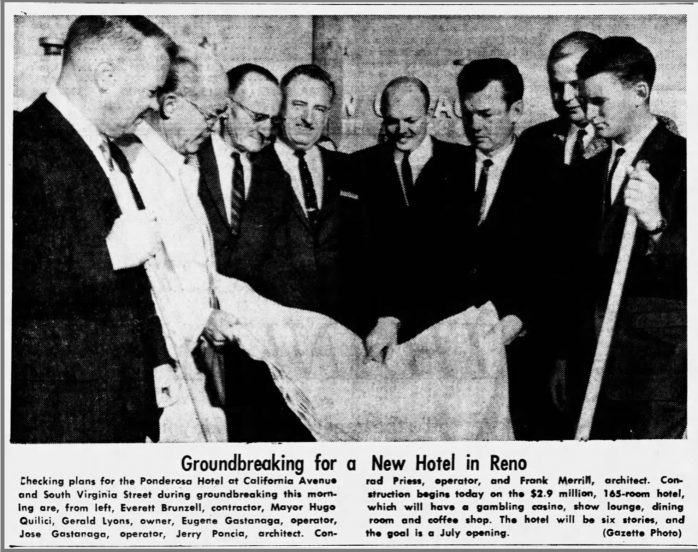
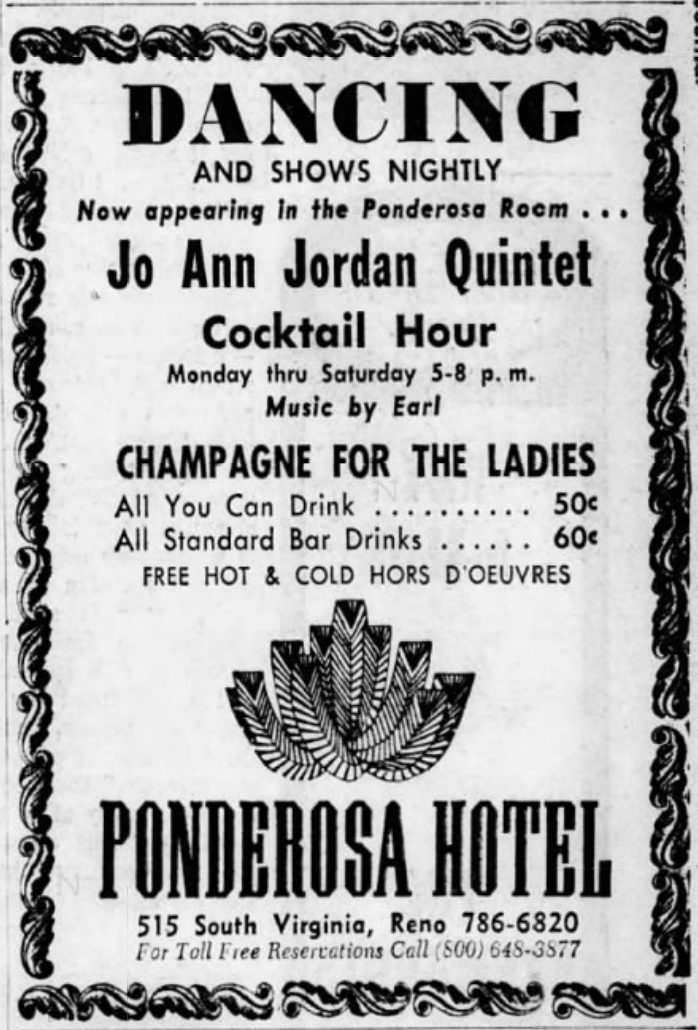
_________
1989: The hotel expands and adds a casino.
(That’s Kamy’s dad, Joe Keshmiri, on the right.)
_________
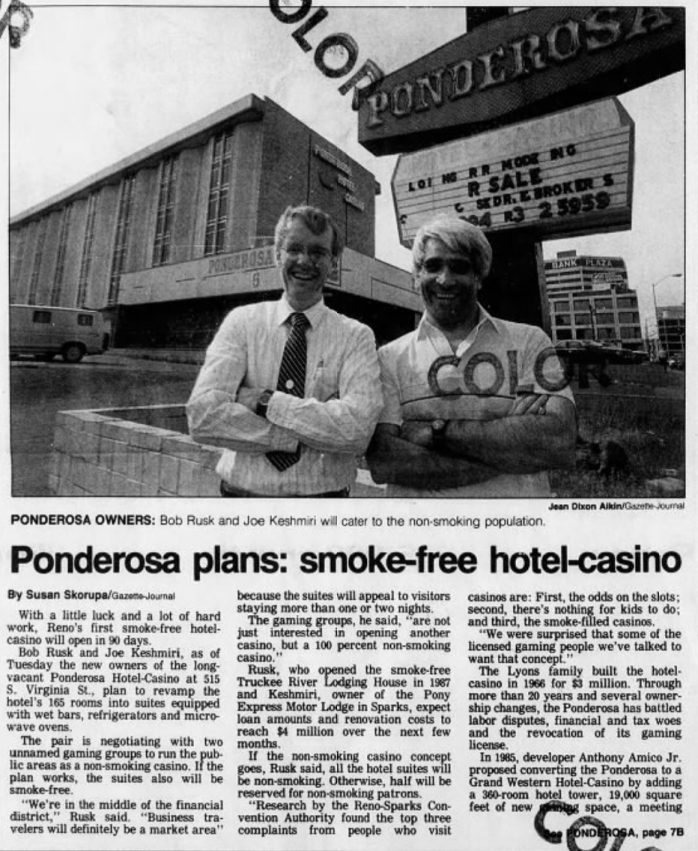
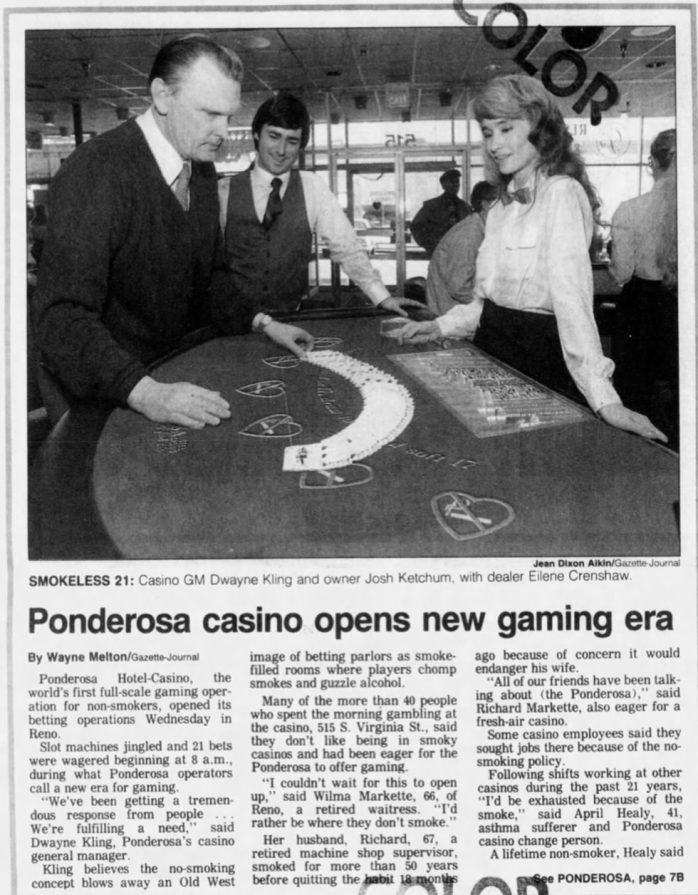
_________
Kamy joins the family business after quitting discus. They turn the casino into a nightclub, Discopolus, an homage to their discus-throwing past.
_________
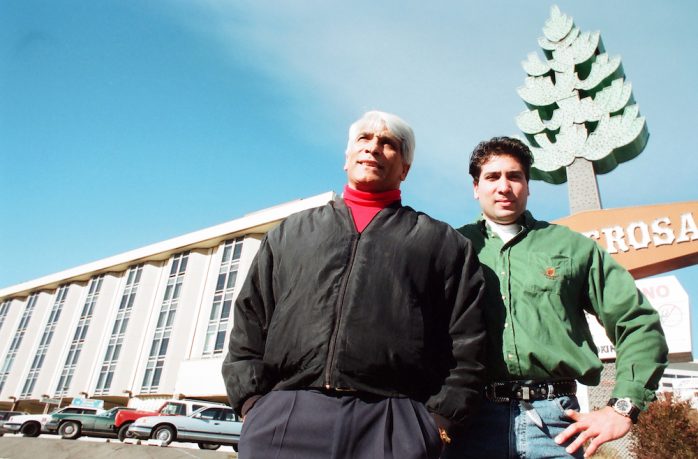
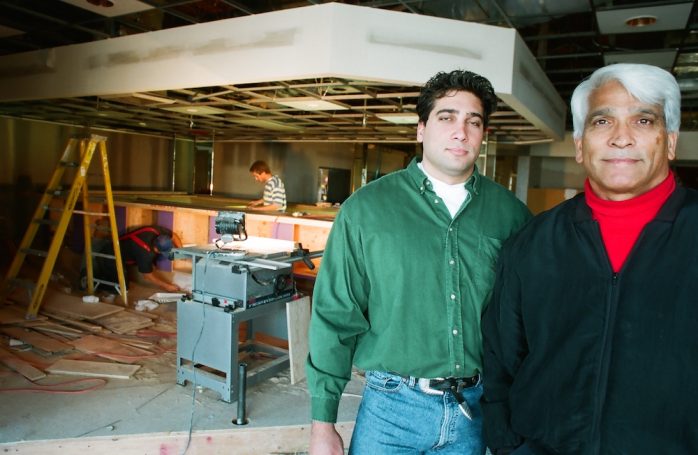
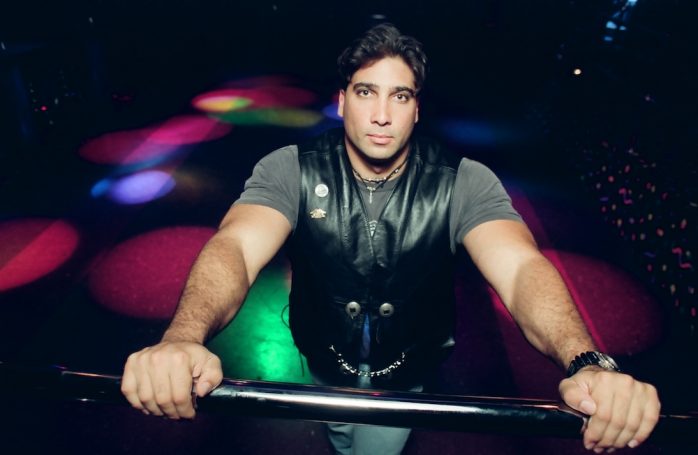
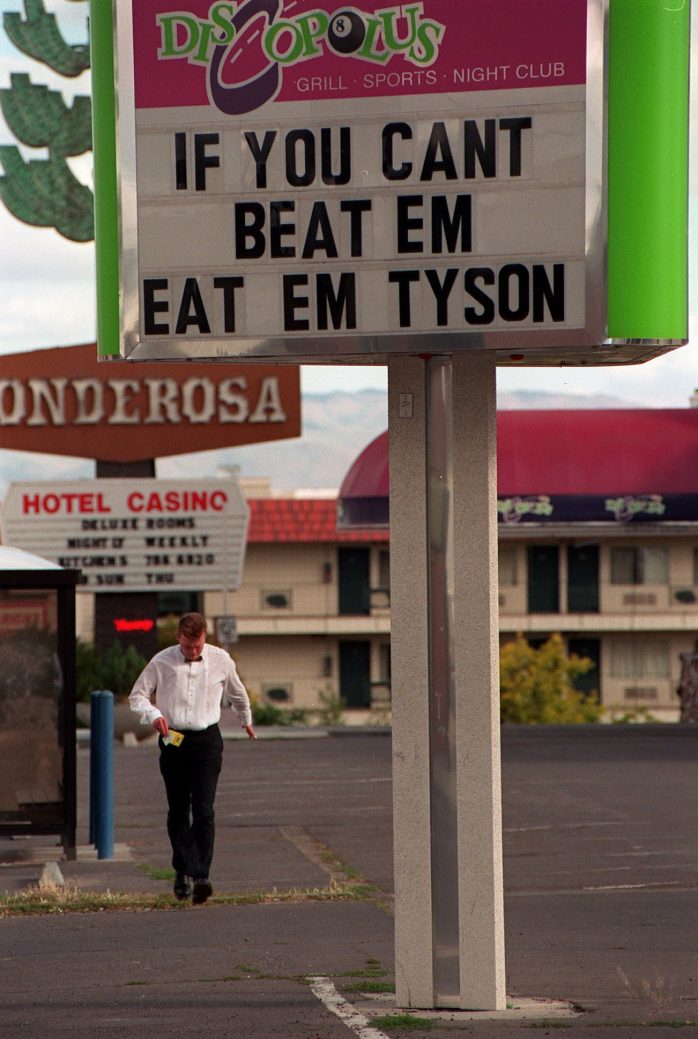
_________
In the late 1990s, the Keshmiris turn Discopolus into a strip club—the Wild Orchid.
_________
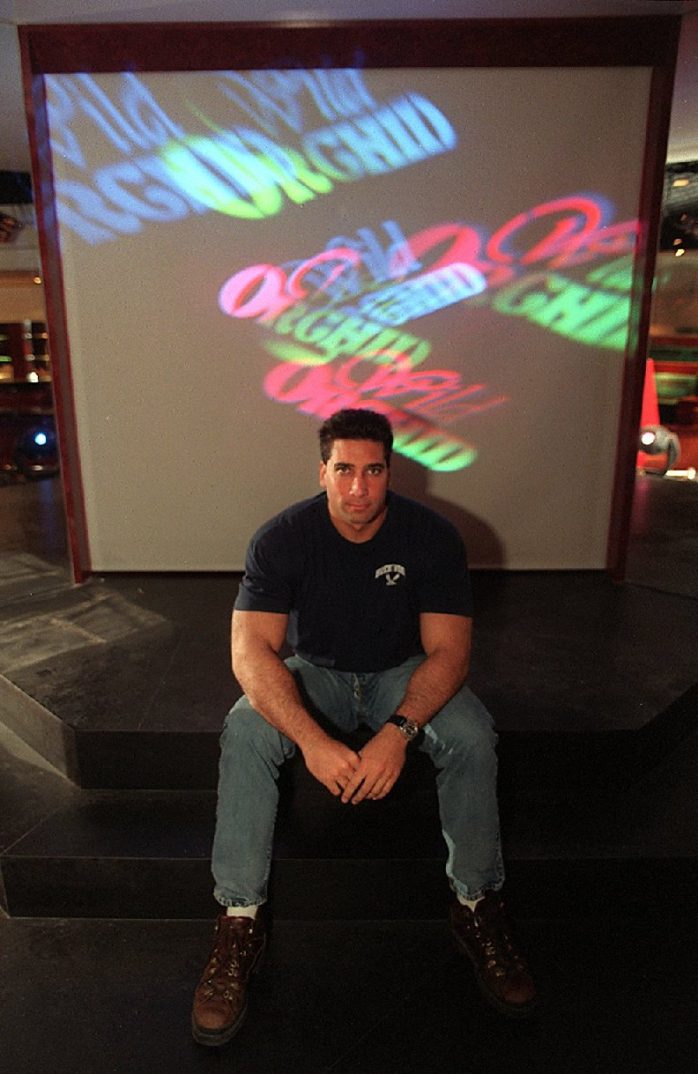
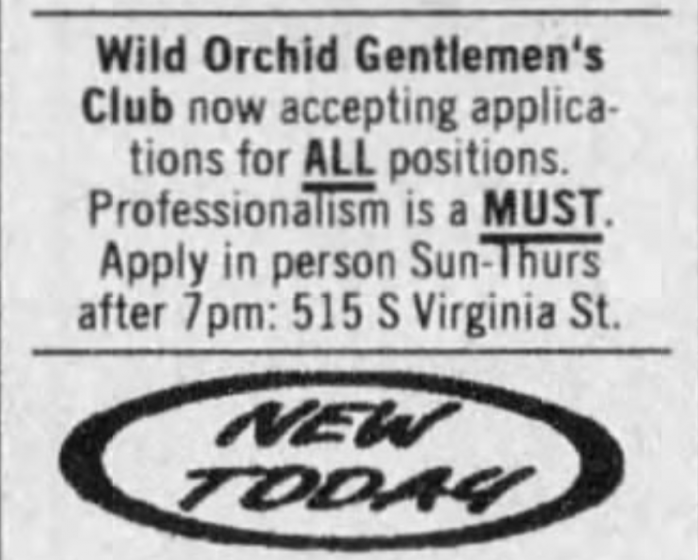
_________
The Keshmiris secure a cabaret license just before the city puts a temporary ban on new strip clubs downtown.
_________
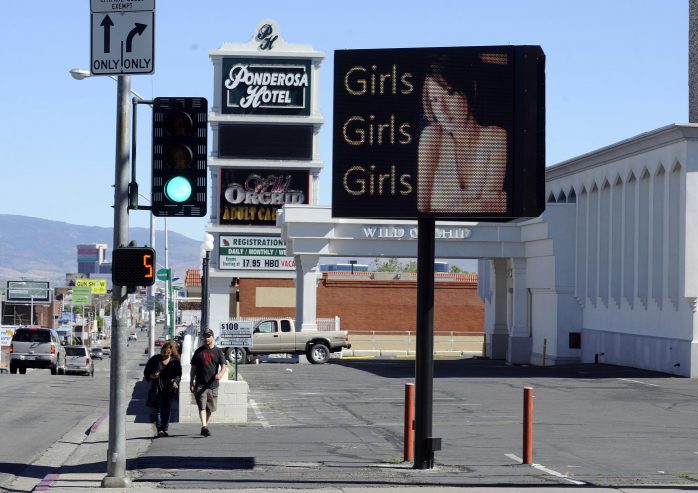
_________
The Wild Orchid, present day.
_________
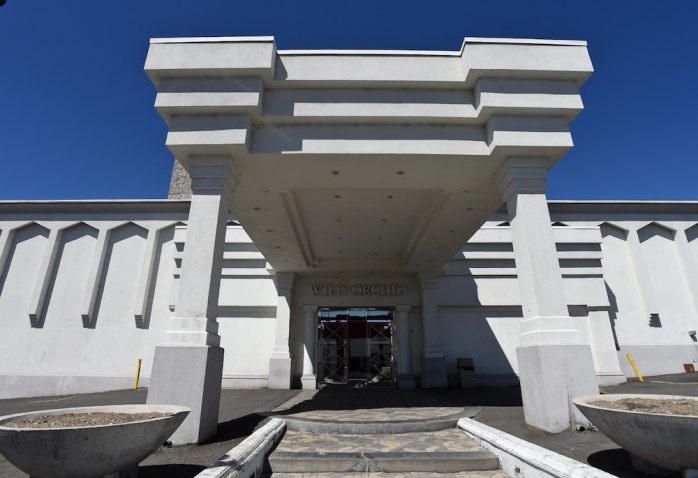
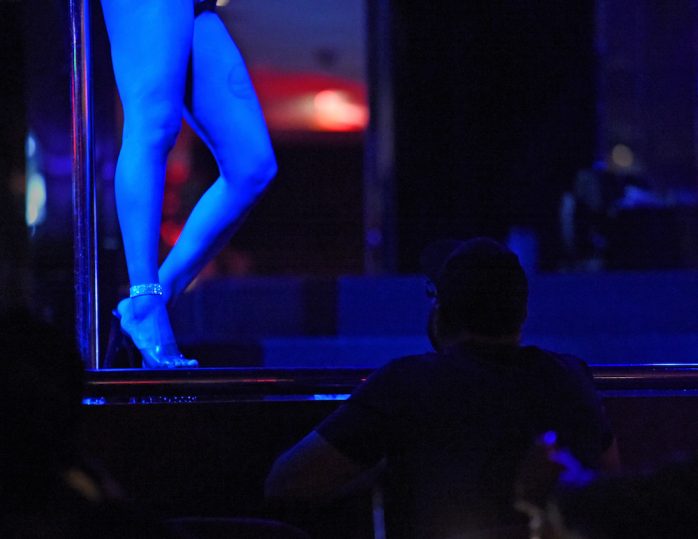
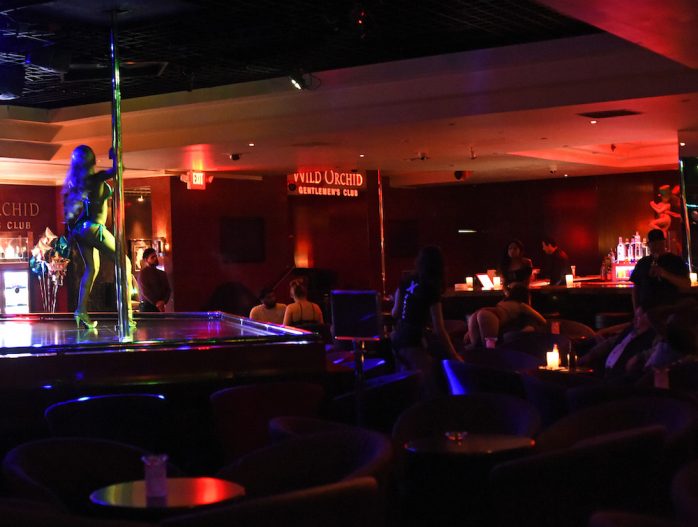
_________
The Ponderosa Hotel, present day.
_________
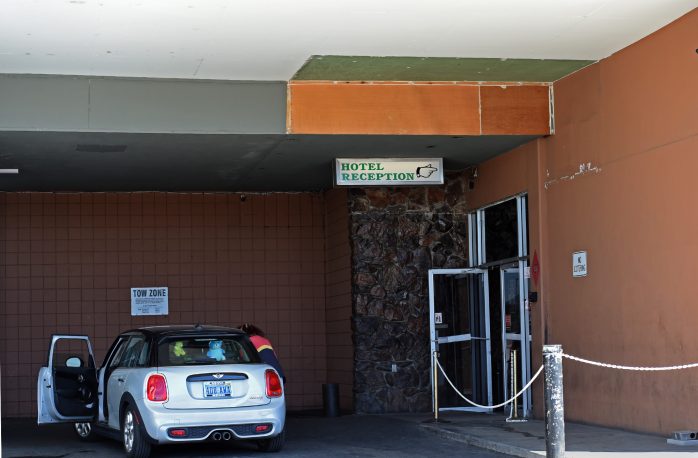
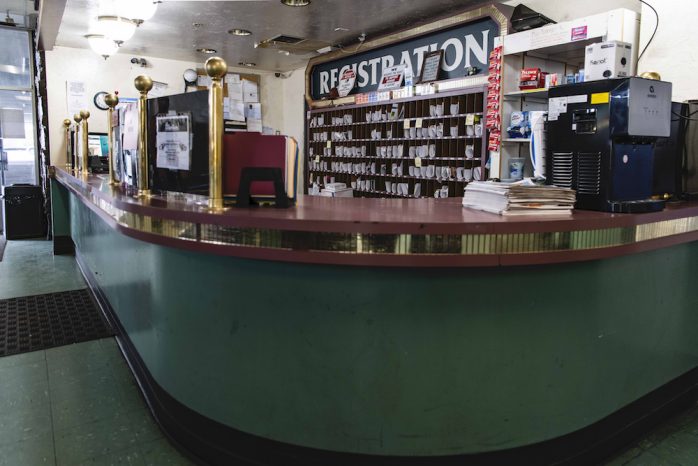
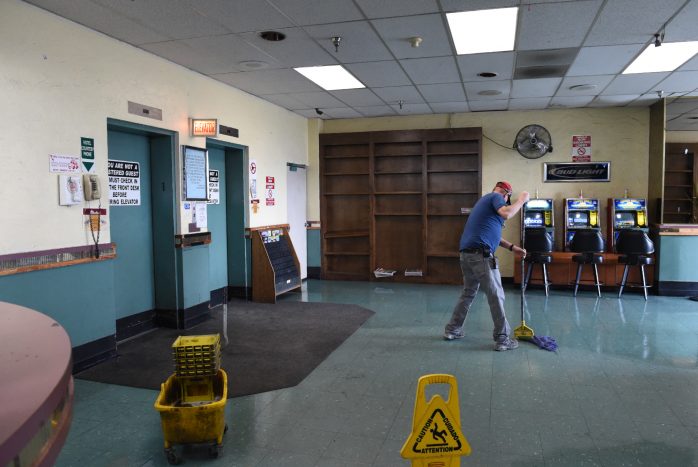
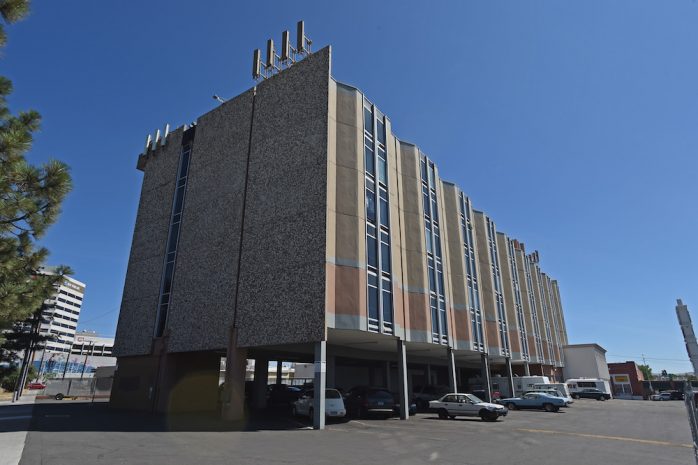
_________
How can I listen to The City? You can scroll up and press the play button at the top of the page, or click here for more listening options.
Let us know what you think of the show! Leave a review on your favorite podcast app, or get in touch on social media.
Follow Season 2 reporter Anjeanette Damon on Twitter: @AnjeanetteDamon. If you’re interested in advertising with The City, you can email us with this contact form.
Transcript
Robin Amer: Hey everyone. I know that you know this by now, but just to remind you: because this season of The City is about strip clubs, it’s not gonna be suitable for everybody, especially kids. And this episode in particular has a lot of very explicit conversations about sex.
OK, here’s the show.
Production team member: Previously on The City…
Velma: “To all Ponderosa hotel tenants: Unfortunately I must relay some bad, very bad news to you.”
Kamy: It’s sad that you’re wasting city of Reno resources on this, on bringing private investigators in to look at boobs. That’s all it is. Yeah, there’s boobs.
Anjeanette Damon: I just discovered that Karl Hall owned an office building pretty much across the street from the Wild Orchid and he just sold it in March for like $1.1 million dollars.
Mark Thierman: Wow. That bastard. OK.
Kamy Keshmiri: My dad’s like, “Well, you learn to fight back.”
Velma Shoals: This has been a home for my granddaughter since elementary school and we don’t want that taken from us. Please don’t take that from us.
Thierman: Fuck ’em. They wanted to see what war is, we’ll show ‘em what war is.
Robin Amer: To really understand Reno’s present day strip club battle—why Reno has suddenly put the squeeze on its clubs and why Kamy Keshmiri is fighting back so hard—we have to go back in time.
Because this fight actually stretches back more than a decade.
It’s a frigid Thursday night in Reno, back in January of 2007. But inside the Wild Orchid, dancers are warming up for a big night.
For years, Safari Club International has held its annual convention in Reno.These are big game hunters—hundreds of them. During the day, they talk about their latest trophy kills. And at night, they head downtown for some fun.
Tawny: Like, we couldn’t wait for Safari Night. Every table is full, standing room only, all five stages going, and you have money and you can make it all night long.
Robin Amer: That’s Tawny. Back in 2007, she was one of the Wild Orchid’s top-earning dancers—an “A-list” girl who loved to party and knew how to hustle for money.
Tawny was looking forward to work that night. But when she arrived at the club, the door girl had a warning.
Tawny: She looked at me and said, “You don’t want to be here.” And I go, “What are you talking about? It’s Safari Nights.” She goes, “The cops are here. Street enforcement’s here.”
Robin Amer: But Tawny wasn’t going to let that stop her.
Tawny: And I, I remember this to this day. This is my exact words to her. I go, “But I don’t have anything to worry about.” I said, “I have my licensing and I have my I.D. and I don’t do drugs.”
Robin Amer: But as it turns out, she did have something to worry about.
The club’s lawyer, Mark Thierman, was also there that night. Here’s how he remembers it:
Mark Thierman: The SWAT team shows up at 9 o’clock in their black Kevlar outfits—I’m sitting there, I’m at the bar, I’m sitting there—and their sun visor helmets, and batons, and shotguns, in the middle of Safari Week!
Robin Amer: Pretty much since it became a city, Reno has swung on this pendulum. At one end, Reno embraces vice and the economic bounty it can bring. Then it starts to recoil at its own seedy image, and the pendulum swings the other way.
Back in January 2007, the city was cracking down. Case in point: Police officers in full tactical gear raiding the Wild Orchid on one of the busiest nights of the year.
Today, Reno is at a similar crossroads, trying to decide if it wants to continue embracing vice or let the new economy put it to rest for good.
I’m Robin Amer and from USA TODAY, this is The City.
Act 1
Robin Amer: So, before the break, we talked about this pendulum in Reno that swings between permissiveness on one hand and restrictiveness on the other. In some ways, those swings correspond with economic boom and bust cycles.
When the economy is bad, vice tends to thrive, because when the city is desperate, it tends to be more lenient. And when the economy starts to turn around, the city faces a choice: lean toward respectability or double down on vice.
To get into the strip club business in the first place, the Keshmiri family had to time these shifting winds just right.
Here’s our reporter, Anjeanette Damon.
Anjeanette Damon: In 1992, Kamy Keshmiri was in a bad place. His soaring athletic career had come crashing down when he tested positive for steroids a month before he was set to compete in the Olympics.
But right away, he started looking for that next opportunity. He told me about it during one of our interviews in the back room of the Ponderosa Hotel.
Kamy Keshmiri: So I figured, if I can be the number one in the world in discus, what could I do in business?
Anjeanette Damon: His younger brother, Jamy, was just getting out of college.
Jamy Keshmiri: And my father’s like, “Look, OK, what are these guys gonna do?” You know, we didn’t get degrees as doctors and lawyers, and we, I think, we generally wanted to be like him. We wanted to be businessmen, you know?
Anjeanette Damon: At the time, their dad owned what was then the Ponderosa Hotel and Casino. But the casino was struggling.
Las Vegas had long since eclipsed Reno. And while the city’s bigger hotel casinos were doing just fine, smaller ones were closing left and right as casino gambling spread to other parts of the country.
Kamy Keshmiri: These buildings are becoming dinosaurs. Everybody’s abandoning, alright? The Pioneer. Remember the Pioneer, next door? Gone. Kings Inn, gone. All these properties just evaporating.
Anjeanette Damon: The Keshmiris figured, if they couldn’t make a go of the casino, why not use the space for something else entirely?
Kamy Keshmiri: And so, I came to my dad and I said, “Look, nightclubs—we have all this parking. We’re right here.”
Anjeanette Damon: In 1994, they opened their new club and called it Discopolus—named after the classic Greek statue Discobolus. The statue depicts a muscular young discus thrower in the wind up position, ready to let loose his throw. The club was decorated with a replica of the statue.
That replica is still around, sitting deep in the basement of the strip club. It bears a strong resemblance to Kamy, actually.
With the help of some publicity gimmicks, like wet T-shirt and bikini contests, Discopolus flourished, drawing people to an otherwise dark stretch of downtown. And for the most part, the city council let the Keshmiri family do its thing. But that wouldn’t last.
This is how Reno tends to operate: sanctioning debauchery one minute, then restricting it the next.
It’s actually been happening since Reno was just a dusty Wild West outpost in a state people mostly traveled through on their way to get somewhere else.
Reno sprung up in the 1860s as a rough and tumble supply town for nearby silver mines. Brothels, bars, and gambling halls peppered the streets. But then the silver mines went bust, and the town almost did too.
Over the next couple of decades, Reno struggled with its identity. It found success in agriculture and broke ground for the state’s first university. But it held on to that rough-and-tumble character and was never quite willing to give up its brothels and gambling.
Then, in the early 20th century, it found a new vice to embrace: divorce.
Back then, getting divorced was not only scandalous, it was hard to do—except in Nevada. In no other state could you get a divorce as quickly. So people looking to end their marriages flocked to Reno from around the country, especially people with means.
Reno became synonymous with quickie divorces, and Hollywood movies of the era would often cast Reno as a dusty backdrop for a character looking to end her marriage, like Marilyn Monroe in The Misfits, or Pauline Moore in the 1938 film Charlie Chan in Reno. Here’s Moore on screen chatting with a Reno cab driver.
Cab driver: This your first trip here?
Moore: Yes.
Cab driver: I thought you looked strange. Some of ‘em come so often I was thinking of printing up commuter tickets! [Laughs, then sees she doesn’t think it’s funny.] Oh well. I guess divorce ain’t much more than a matter of traveling. You check out of the state of matrimony and land in the state of Nevada! I ain’t got no complaints though. Owe my living to divorces, same as most of the people in this town. And by gosh, it’s the one business that even the Depression don’t hit!
Anjeanette Damon: In the ‘30s and ‘40s, more brothels and casinos sprung up to entertain those wealthy soon-to-be divorcees.
Narrator: This is a city of glitter and glamour, a city of neon and bright lights, of spinning wheels and dancing feet. This is Reno, the biggest little city in the world!
Anjeanette Damon: Over time, Reno found that making legal what other states made illegal was a really easy way to boost its economy.
Now, strip clubs aren’t typically illegal, even in other cities. But in the 1990s, they sure fit in well with the overall adult party scene that thrived in Reno.
In 1995, the Discopolus nightclub was prospering. But Kamy’s dad was getting nervous. Those wet T-shirt contests were getting a little wild sometimes, and tops would come off completely.
So the family sought a cabaret license from the Reno City Council. Even though the license would allow them to open a strip club, they assured the council they had no plans to go full-on topless.
During that meeting, one councilwoman wanted to know if the Keshmiris would have any male strippers. So Kamy offered to perform for her in a G-string. It was a little too much for the councilwoman, who ran out of the chambers covering her face with a handkerchief.
Kamy got his topless cabaret license that day. It turned out to be just in time.
Topless bars were popping up all over the place and that made police nervous. They worried that the clubs would attract drugs and prostitution.
Within months of granting that cabaret license to the Keshmiris, the council issued a temporary ban on new strip clubs.
But despite the family’s promise to the council, Kamy and Jamy did have their eye on the strip club business.
Here’s Jamy:
Jamy Keshmiri: We knew the strip club revolution’s coming. We saw how well they were doing, and we had a license. We’re like, we need to take advantage of this now.
Anjeanette Damon: So they remodeled Discopolus and opened it as the Wild Orchid strip club, even though the city had a ban on new strip clubs in place.
The city attorney told an indignant city council it could do nothing to stop it, because the Keshmiris already had that license. Once you grant a right, he said, you can’t take it away.
The Keshmiris had cemented their prime downtown location, and thanks to the moratorium, they had a competitive advantage—the city wasn’t going to let any other strip clubs open up downtown.
For years, the Wild Orchid thrived as part of downtown Reno’s party scene. Dancers made buckets of cash—and so did the Keshmiris.
The city checked in from time to time, making sure dancers had their licenses and work cards. But for the most part, the city stayed out of their way. Until 2007.
An off-duty cop happened to be hanging out in the Wild Orchid one night. He later told his bosses that while he was there, a dancer propositioned him for sex. That’s when Reno PD began hatching a plan.
This brings us back to that frigid night in the winter of 2007 when the big game hunters were in town.
Tawny, the A-team stripper, is on her way into work at the Wild Orchid. Lawyer Mark Thierman is sitting at the bar.
An undercover cop walks into the club. He pays his cover fee and sits at a table. A dancer approaches.He later reports she offers him oral sex in the back room for a thousand dollars.
Tawny wasn’t quite at work yet when this went down. But she knows that dancer.
Tawny: He basically led her into talking dirty to him at the table, just so she could get him into VIP.
Anjeanette Damon: Tawny says the young woman hadn’t been stripping for very long. She didn’t know how to play the game of staying just vague and sexy enough to get a guy into the VIP room without actually promising him sex. That’s the balancing act a stripper has to play to make decent money.
Tawny: But he led the conversation. She was on tape. So they constituted that as prostitution. She was handcuffed in front of everybody and dragged out, and she was one of our most classiest 19-year-olds studying to be a doctor. She didn’t even fucking drink.
Anjeanette Damon: When the cop lands that alleged deal for oral sex, it triggers a full on raid. A dozen officers waiting outside stream into the club.
Mark sees them rush in from his perch at the bar.
Mark Theirman: It was pretty scary, and they ran around. They had these big shotguns they carry, and they rounded up everybody and told all the dancers to go down into the locker room and wait.
Anjeanette Damon: What were the patrons doing?
Mark Theirman: They were leaving. [Laughs] I mean, as soon as this happened, they got out of there.
Anjeanette Damon: Downstairs, the cops start checking dancers’ IDs, making sure each one has a proper license and work card. It’s a task that’s usually carried out by a bureaucrat with a clipboard, not a cop with a shotgun.
Mark Thierman But they showed up with 13 SWAT officers in full riot gear, to, I guess check the licenses of half a dozen females who were wearing bathing suits and no visible signs of a weapon on them. I don’t know. I mean, they had sharp nails.
Anjeanette Damon: This is about when Tawny shows up for work. She isn’t about to give up a lucrative night just because the police are here. She doesn’t know that they’d already scared most of the patrons.
On her way downstairs to the locker room, she passes several cops.
Tawny: I still thought it was weird that it was street enforcement. Like, why would the city of Reno waste all this money on their street enforcement police officers that could be out there taking care of gangs and drugs and all that kind of stuff and they’re in our strip club? [Laughs]
Anjeanette Damon: Tawny’s license is valid, so she’s not worried. Other dancers are a little more freaked out.
Tawny: It was funny because a few weeks later, we realized that a couple of the girls that had warrants that nobody knew had warrants had gotten in their lockers and had other girls lock them in their locker. And they stayed in their locker with it locked during the entire raid.
Anjeanette Damon: Oh my gosh! Oh my gosh!
Tawny:Yes! And the cops never found ‘em.
Anjeanette Damon: When she gets downstairs, Tawny finds the locker room full of male police officers, which is problematic. Men generally aren’t allowed in the locker room, even male staff members, so the dancers can get ready for work in peace.
Tawny starts getting ready anyway. She takes off her street clothes and rummages through her locker for the lingerie she wants to wear for the night.
Tawny: And the two male officers walked up to me and they go, “We need to get your I.D.” And I said, “You can get my I.D. after I put on my clothes.” And they said, “You can’t touch your locker and you can’t move.” And I go, “I am naked right now!”
Anjeanette Damon: Tawny says this was the most dehumanizing part of the raid. It’s one thing to perform topless for clients. It’s another to be stared at by cops while you’re trying to get dressed.
Tawny: They didn’t have one female advocate for us, nor did they care to have it. They treated us like, “Oh you’re strippers, you take off your clothes for a living, so you’re used to being naked, so you better be OK with this.”
Anjeanette Damon: The police department refused to talk to me about what happened that night. But I read all their affidavits about the raid. In the documents, they disputed some of the dancers’ versions of events. For instance, they said women were offered the opportunity to get dressed and were never gawked at.
But there’s something else you should know.
The day before the police raided the Wild Orchid, Mark Thierman had filed his first lawsuit against the city. Mark liked to hang out at the club and he’d become friends with Kamy.
Mark Thierman: He was complaining about how the police are basically hassling him, they’re shaking him down. They’re not asking for bribes, but they’re, they’re in there at weird hours asking for weird things, picking on him. And they are!
Anjeanette Damon: Basically, in the year before the raid, the police had been showing up at the Wild Orchid without a warrant, demanding access to all parts of the club to make sure it was following city code. Mark persuaded Kamy to fight back, filing a suit that claimed these warrantless searches were illegal.
Mark is convinced the Safari Night raid was straight up retaliation for that lawsuit.
Later, as that lawsuit wound its way through court, the police sergeant in charge of the operation said in an affidavit that the police department had no idea the lawsuit existed when they raided the club.
But the federal judge presiding over the case was not happy.
He called an emergency hearing and slammed the city for how the police conducted themselves. He demanded to know why the cops had raided a club on one of the busiest nights of the year, demeaned the women working there, and disrupted business. The judge even said that the local law the city relied on to send the cops in the club in the first place was likely unconstitutional.
In the end, the city agreed to rewrite that law and settled the lawsuit for $100,000 in taxpayer money. Five dancers caught up in the sting got $3,000 each, including Tawny. The rest of the money went to the Keshmiris.
After being chewed out by a federal judge, the Reno PD pretty much disappeared from the Wild Orchid altogether. No more license checks. No more undercover operations. They left the club alone.
The pendulum had swung back to permissiveness.
Robin Amer: The judge’s order wasn’t the only thing that prompted that pendulum swing. The economy crashed. And Nevada was one of the states hardest hit. Reno had been riding particularly high on the housing boom and it suffered deeply in the crash.
The Great Recession laid to waste entire Reno neighborhoods. People abandoned their houses. Builders up and left projects in the middle of construction. And the recession ravaged city government. With its tax base gutted and bigger problems to worry about, over the next decade the city pretty much forgot about the strip clubs.
But some people found opportunity in that crisis. When we come back, Anjeanette tells the story of the rise of Midtown—a story that might sound familiar to some of you, and one that explains how gentrification came calling on the Wild Orchid.
That’s after the break.
ACT 2
Robin Amer: After the 2007 financial collapse, the real estate market in Reno ground to a halt. The recession put big developers out of commission.
But that opened opportunities for others.
In Midtown, cheap rents beckoned to young artists and would-be small business owners. They started opening bars and restaurants, coffee houses and boutiques. In other words, the recession opened the door for a wave of gentrification in Midtown—something that was happening in a lot of American cities around that same time.
Here’s Anjeanette.
Anjeanette Damon: If you think you’ve got an idea of what Reno is—an idea reinforced by those late-night comics who love to call the town a dump—Midtown Reno might change your mind. Today, anyway.
It didn’t used to be such a thriving neighborhood. In fact, it was a pretty rough place.
To get an idea of what the neighborhood used to be like, we caught up with Clint Neuerberg at the craft beer store he owns there.
Clint’s relationship with this neighborhood goes back to before anyone even called it Midtown. When he was a teenager in the ‘90s, he remembers dodging drug addicts on his way to punk shows at a music venue called Delmar Station.
Clint Neuerburg: More than once I was at a show there, and someone either got shot, stabbed, or run over outside. Like, it wasn’t an uncommon thing to leave there and there be cops everywhere.
Anjeanette Damon: When he later moved into the neighborhood, it was still a sketchy place to live or operate a business.
That began to change when a young artists’ co-op called the Holland Project opened up a small event space across from where Clint’s bottle shop now stands.
Clint Neuerburg: And I think that was a key part of it, was bringing young artists into this neighborhood.
Anjeanette Damon: This is the path gentrification seems to take in many American cities: When artists show up in a neighborhood, developers are never far behind.
Next door to the Holland Project, a guy named named Mark Trujillo opened a tiny coffee shop called the Hub in what used to be a brick two-car garage built in the ‘40s.
Clint Neuerburg: I remember when Mark started building that place, I’m like, “He’s building a coffee shop there? Like, what, does he hate money? [Laugs] Like, that’ll never work,” sort of thing. Yeah, smash cut to now, it’s like he’s got this coffee empire that all started in that garage, basically.
Anjeanette Damon: Soon the neighborhood was a thriving urban center, full of bars and restaurants. The building that housed Delmar Station, the sketchy concert hall from the ‘90s, became home to a cheese shop and a juice bar.
Of course, Midtown hasn’t lost all its grit.
Clint Neuerburg: There’s still a lot of areas of Virginia Street where you have to walk around a porno theater to get to your Thai restaurant or funky hipster thrift store.
Anjeanette Damon: But that porn theater may not be there for long. Another wave of gentrification is cresting.
It’s a warm summer Saturday morning in Midtown. The sun is just barely above the mountains to the east. Some of the more dedicated bar hoppers from last night stagger out of a nearby bar. A homeless man wanders by. I’m meeting up with Joe Morino, owner of Nameless Coffee.
It’s not long before the place gets busy.
This tiny coffee shop used to be the Hub, the one in the two-car garage. Joe used to be a barista there before he bought the place.
Joe Marino: It was the only coffee shop of its quality. Yeah, so it’s kind of like people didn’t have a choice. But now it’s different. Plenty of shops around the neighborhood, and they’ve got all kinds of different milk alternatives and sugar syrups and whipped creams, and I think they had coffee, too. [Laughs]
Anjeanette Damon: Over the years, it’s become a gathering place for the people who live and work in the neighborhood. There’s a violin maker, the owner of a pizzeria, scientists, writers, a second-hand jewelry shop owner, a guy who drives around town in an electric hearse—and me.
I always thought, if I write that novel, the characters would come from the people I met here while drinking coffee and playing chess with my son.
But today, Nameless is closing its doors. There are too many coffee shops around, not enough parking. Joe’s had enough.
So the regulars have gathered for a final early-morning toast, clinking their espresso cups in tribute to Joe.
Joe Marino: Cheers, everybody. Last, last go-around in the morning.
[Clinking espresso cups]
Customer: Hey, you’ve been a blessing to us. You get us up every morning.
Joe Marino: Likewise. You’ve been a blessing to me, too.
Anjeanette Damon: The second wave of gentrification is here, driven not by locals, but by big-name developers with deep pockets.
They’re bringing high-end wine bars and sushi burrito joints. Consumers from the suburbs are replacing the hipsters that helped places like Nameless Coffee thrive.
But as this wave moves across Midtown, the Wild Orchid is standing in its way.
This gentrifying neighborhood is New Reno’s crown jewel—a symbol of Reno’s transformation from tired casino town to vibrant modern city. A transformation fueled by a new high tech economy of Silicon Valley giants and start-ups alike.
Midtown is the first place Mike Kazmierski shows off to the tech bros coming to town looking for office space.
Mike is the former military commander turned economic development guy that we met in Episode 1. The one who hates strip clubs.
I wanted to hear the New Reno sales pitch for myself. So last spring I asked Mike to drive me around town as if I were one of his clients—a prospective business owner interested in moving to Reno.
Mike Kazmierski: Well, we’ve just crossed the river, and really most communities would kill to have a river run through it like this.
Anjeanette Damon: He brings along one of his staffers, Bryan McArdle. He’s young, clean cut. Used to own a hookah lounge in downtown, actually. He’s the guy that schmoozes tech clients.
Bryan McArdle: We’re driving into Midtown, which is sort of the main street that leads into our downtown corridor. And over the last decade, it’s sort of transitioned to be the foodie, cultural, artsy section of downtown.
Anjeanette Damon: We approach the Wild Orchid and the six-story Ponderosa Hotel that rises behind it.
Near the street sits is a cluster of residents smoking and chatting, The digital sign is flashing “GIRLS GIRLS GIRLS.” There are weeds growing in the planters at the front door. It turns out Mike actually skips this part of the tour when it’s a real client in the car.
Mike Kazmierski: The Wild Orchid, I will specifically not drive a client past the Wild Orchid’s sign, because I think it’s an embarrassment to our community.
Anjeanette Damon: Bryan agrees.
Bryan McArdle: As you drive through Midtown, you see all this vibrancy—these new restaurants, new small businesses popping up, and this, that specific strip, it just stands out. It’s, like, such a sore thumb in the midst of everything that is changing.
Anjeanette Damon: The Reno that Mike and Bryan want people to see is full of bustling restaurants and breweries and tech start-ups and urban living. And we have all that. But not only that.
We next drive past the city’s only homeless shelter. It’s an overcrowded complex in an up-and-coming brewery district in the eastern part of downtown.
Do you drive your clients past the homeless shelter? I ask.
Bryan kind of dodges my question.
Bryan McArdle: Yeah, I don’t say, I wouldn’t say that we have a homelessness issue. I think it’s more perception than reality.
Anjeanette Damon: Mike doesn’t correct him. But we are literally staring at a block filled with homeless people waiting to get into the shelter for a meal or a shower or a bed.
Perception versus reality. In many ways, that’s Mike’s whole fight.
Robin Amer: As that tension between perception and reality continues to drive the fight over Reno’s strip clubs, the city council is once again asked to weigh in on the clubs and what they mean for the city’s image.
This time, though, it looks as if things might go well for Kamy. But this meeting, and what happens after it, takes a surprising turn.
That’s after the break.
Act 3
Robin Amer: In this drawn-out fight over Reno’s strip clubs, the city council is clearly struggling with how far to swing this pendulum between vice and respectability. And there are a few key meetings where this plays out.
The first we heard in Episode 1, when the council set the ball rolling on laws to kick the strip clubs out of downtown. And the second came seven months later, in April 2018.
Now, going into this meeting, Kamy Keshmiri is feeling pretty confident.
Here’s Anjeanette.
Anjeanette Damon: Ok, I’m back at Reno City Hall for another council meeting.
Mayor Hillary Schieve: Alright, Madam Clerk, back at ya.
Clerk: Madam Mayor, with that, we are on item J3—adult business regulations—
Mayor Hillary Schieve: OK!
Clerk: —and I do have public comment on this item.
Mayor Hillary Schieve: OK, fantastic.
Anjeanette Damon: The strip club issue is on the agenda for, like, a status check. But a lot has happened behind the scenes since that meeting seven months ago.
Most notably, Mark Thierman has filed another lawsuit, this time accusing the city of discriminating against female strippers.
This lawsuit is key.
It gave Kamy and Mark direct access to a pivotal Reno City councilwoman, Naomi Duerr. You see, parties to federal lawsuits are required to enter into settlement talks. And Naomi Duerr was appointed as one of the city’s mediators.
Kamy and Mark could talk with Councilwoman Duerr under the guise of mediating the lawsuit, all the while lobbying her to oppose the real issue at play: kicking the clubs out of downtown. And it just so happened she was on the fence about that whole thing anyway.
This meeting was an opportunity for the council to change its mind.
And headed into it, Kamy and Mark were hopeful that their lobbying efforts had paid off.
Kamy was willing to clean up the outside, plant some trees, tone down the digital sign and agree to more video surveillance inside the club. They expected that would be enough to get the council to back off.
And in a show of good faith, Mark dropped his lawsuit. He told me about it over the phone.
Mark Thierman: I mean, I just, I got nothing in exchange for it but a promise to rethink, ‘cause they said, “Oh, we learned so much.”
Anjeanette Damon: But when I caught up with him a few days later, he already had a bad feeling about things.
Anjeanette Damon: How do you, how do you think Wednesday’s meeting, that’s gonna go down?
Mark Thierman: I think it’s gonna be a shitshow. I think everyone in the room there is going to be confused about what the issue is. I think they’re going to be shouting, screaming on all sides, and no one’s going to walk out happy. I don’t know if the city council even knows what they’re doing or what they’re voting on. I don’t understand what they’re voting on.
Anjeanette Damon: Mark called it. In that council meeting, confusion did reign for a minute. At least one councilman was like, “Why are we even listening to this? I thought we already decided this issue.”
But it quickly became obvious that this meeting wasn’t called so the council could start backing off of Kamy. This meeting was called so the council could turn the screws even tighter.
Remember that private investigator report I told you about last episode? The one that suggested there might be an issue with drugs and aggressive touching in the clubs? Well, it turned council members’ attention to what was happening inside the strip clubs.
And now they wanted a slew of new restrictions that could be catastrophic for the clubs, cutting at the very heart of the stripping business in Reno. Restrictions that would bring Reno’s clubs more in line with the way other cities regulate their strippers.
Here’s the deputy city attorney, Jonathan Shipman:
Jonathan Shipman: What staff would looking at was limiting the performance areas to stage only, putting in place distance requirements between performers, implementing no tipping, touching from patrons…[fades under]
Anjeanette Damon: In short: No lap dances, no dancers younger than 21, no private rooms, more bright lighting, and more video surveillance.
These restrictions could put the strip clubs out of business no matter where the clubs were located, or at least make them much less profitable for the owners. And it could really undercut the dancers’ earnings, too.
But the mayor supports these proposals anyway:
Mayor Hillary Schieve: I want them patrolled. I want them well-lit. I want them in places where they cannot hide.
Anjeanette Damon: During the debate, Councilwoman Duerr—she’s the one who entered into those settlement talks with Kamy—she tries to focus the debate on enforcing laws already in place in the city and delaying any plans to make the clubs move.
But it didn’t work.
The council voted to stay on the path of kicking the clubs out of downtown and to start writing the proposed laws to crack down on the behavior inside the clubs.
Mayor Hillary Schieve: All those in favor say “aye.”
Council members: Aye.
Mayor Hillary Schieve: Any other discussion? Seeing that there’s none, all those opposed? Motion carries unanimously. All right. Thank you very much.
Anjeanette Damon: I stopped Kamy and Mark in the city hall lobby when the meeting ended. They were beside themselves.
Mark Thierman: What a waste of time.
Kamy Keshmiri: It’s going to go to court. I mean, we’re just going to go guns-a-blazing into the court, federal court system.
Anjeanette Damon: I mean, do you think they went back on any kind of deal that they gave you, or word that they gave you?
Mark Thierman: No one gave us a deal, OK? But they promised—they promised to listen to us. Look … [fades under]
Anjeanette Damon: As we’re talking, Councilwoman Duerr approaches us and pulls Mark aside. Mark makes it clear this is not for my ears, but I’m standing right there.
Mark Thierman: [To Anjeanette] Just give me a second. [To Duerr] What happened?
Naomi Duerr: I tried…[fades under]
Anjeanette Damon: It’s a little hard to hear and it may have gone by fast, but Mark turns to Duerr and asks, “What happened?” And she says, “I tried…”
Tried what? It seems to me the councilwoman was saying she tried to get the council to go along with whatever agreement had been broached in the settlement talks and it didn’t work.
Naomi Duerr catches me watching them and stops talking. Says she’ll catch up with Mark a little later.
Mark walks over to me, even more irritated.
Mark Thierman: What the fuck happened up there? They went crazy on us. They said, “Oh, we’re gonna do this anyway.” Then why do we bother even talking to them?
Anjeanette Damon: Kamy has just lost another round.
This is where the fight moves out of city hall and back into the strip clubs.
Council members were disturbed by that private eye’s report. But they wanted real proof. So before long they would secretly send their police force back into the clubs.
And this move by the police, it ends up targeting not just Kamy, but also the women who work in his clubs.
Three months after that council meeting, a trio of undercover cops hit the Spice House on a Friday night.
Door girl: Hey guys, can I see your ID, please?
Undercover cop: Sure.
Door girl: It’s a $20 cover charge tonight.
Undercover cop: A’ight.
Anjeanette Damon: One of them has a big long beard and is wearing a baseball cap. The strippers say he kind of looks like Bradley Cooper in American Sniper.
The door girl has no idea they’re cops, of course. And in a delightful twist of irony—I just love this—she tries to get them to sign a petition to save the clubs.
Door girl: I don’t know if you’ve seen us on the news. They want us to move to an industrial area of town. But if we get a certain amount of names and emails, we can stay in downtown. So if you guys do that for me, I’ll definitely give you a free drink.
Undercover cop: Yeah, maybe in a little bit.
Anjeanette Damon: Stephanie, the stripper we met in the first episode, is working her shift tonight. By this time, Stephanie has been working at the Spice House for a couple of months.
Stephanie: So I knew the undercover cops came in there, but I just never thought that anything like that would happen to me, because I always … [fades under]
Anjeanette Damon: She didn’t want to do anything to put her job in jeopardy. Remember, she’s a single mom and needs the money to raise her two girls. So she’s careful.
It’s a pretty slow night when the undercover cops arrive and the dancers are excited to see guys walk in.
Stephanie and a dancer named Serenity approach the group, begin making small talk.
You might remember from the first episode that the cops told the dancers they had just gotten off work. Their friend, the guy with a beard and a baseball cap, had just broken up with his girlfriend and needed some cheering up.
It’s a line I’ve heard the cops use on other undercover operations I’ve listened to this year. “I just broke up with my girlfriend,” or, “Yeah, my wife is out of town, so I’m here to have some fun. I’ve been married for soooo long.” It feels like some kind of strip club code. Like a signal that they want to do business, and not just the lap dance kinda business.
Strippers learn from each other how to play along, keep the guys interested. So Stephanie decides to sit in the bearded guy’s lap.
Stephanie: That’s when the undercover cop said, “Oh, we need someone to sit on my buddy.” And like, I’m just thinking, like, OK, well if I go sit on his lap, I’m for sure gonna get that dance.
Anjeanette Damon: One of the cops asks, “So what’s the craziest thing you’ve seen in here?”
Serenity: So last week, I’m walking in the back, changing my outfit, right …[fades under]
Anjeanette Damon: The loud cheerful voice you hear on the tape is Serenity. She does most of the talking tonight.
Serenity says she was walking through the back to freshen up her makeup when she hears a dancer giving an old guy oral sex in one of the private rooms.
Serenity: Yeah! Funny!
Officer: So that girl hooked up old boy for 30 bucks with a BJ?
Serenity: Yeah! And the funniest thing …[fades under]
Anjeanette Damon: The officer is intrigued. So you can get that kinda thing here? he asks.
But Serenity quickly puts that idea to rest. That dancer got fired, she said. This is not the place to sell sex. If you want to do that, just go to one of the brothels outside of town, she says.
Serenity: Go work in the brothels. Prostitution is legal in Nevada! You can legally do that here!
Anjeanette Damon: Now that the group is primed and having a good time, Stephanie goes to work trying to sell a lap dance in the back. Remember, this is how she makes her real money. It’s $20 for a lap dance on the floor, but private rooms in the back, they start at $150.
So Stephanie’s trying to pull out all her best moves. At one point, she grabs the cop’s hat. Tries to put it on her own head. It’s a seductive move she says usually drives guys crazy. But you can hear the cop freak out.
Officers: I like my hat.
Stephanie: You like your hat? Sorry, I was going to put it on.
Officers: Sorry, it’s my thing. It’s like my security blanket.
Stephanie: Awww. Cute!
Anjeanette Damon: Notice how suddenly you can hear both really clearly, like they’re talking right into the mic. You can kinda guess where he’s got that mic hidden.
The cop keeps pushing Stephanie for sex, even after hearing the cautionary tale about the stripper who was fired: Go to a hotel room with me? Do we need a condom? I want to get some action tonight. This is the stuff strippers deal with every night—and worse.
Stephanie keeps telling him no, reminding him that girls get fired for doing that kind of thing.
But she still wants him to buy a dance.
At this point, Serenity steps in and tries to help Stephanie make the sale. Dancers often work together to essentially upsell patrons. Serenity tells this guy he should pay for both dancers to go in the back.
What can I get in the back? the cop asks.
To that, Serenity dives her head between Stephanie’s legs and pretends to give her oral sex.
Officers: See, that ain’t gonna be fair, you guys are getting down, and I’m just sitting down watching. I mean, how am I going to get involved?
Anjeanette Damon: That doesn’t seem fair, the cop says. How am I going to get involved?
Stephanie remains vague and the cop keeps pressing. He wants to participate. Can he lick her, he asks?
Officer: So if we go in back, and do, like, you know, two of you guys, would I be able to, like, get involved? Like, not like … like, lick you or something? Like, would that be allowed?
Stephanie: Huh…
Officer: Would that be included?
Stephanie: Yeah.
Officer: What about licking you down there?
Anjeanette Damon: Stephanie pauses. She really wants this dance.
Stephanie: Uhhh…[long pause] maybe.
Officer: Maybe?
Stephanie: Maybe if you get me wet enough.
Officer: If I get you wet enough?
Stephanie: Yeah…
Anjeanette Damon: This is how we get to that infamous “maybe” that we heard in the first episode. The word sounds so innocuous. But in this fight, it’s all the cop decides he needs to make an arrest.
He moves quickly to close the deal.
Officer: You said 150 for that?
Stephanie: Mmhm.
Anjeanette Damon: A hundred and fifty bucks for that? the cop asks. Mmhmm, Stephanie answers.
The cop gets up, says he’s going to get some money.
Office Leedy: I’ll, uh … I’m pretty good with that. I’m going to go out to my car and grab some money. I hope you’re ready.
Stephanie: Uh, are you ready for me?
Officer Leedy: Oh yeah!
Anjeanette Damon: Are you ready for me? Stephanie shoots back. This is another line that she’ll come to regret.
As soon as he’s out of the room, the cop radios his team in the parking lot.
Officer Leedy: We got a deal … Heavy set girl in a red top. Heavy-set girl in a red top.
Dispatch: She have a name?
Officer Leedy: She didn’t give me her name. The other guys should have her. She’s still sitting at the table, I think. Wire’s coming off.
Anjeanette Damon: Stephanie, who isn’t actually heavy set, doesn’t realize what’s just happened until a pair of uniformed cops walk into the club and take her into custody.
Anjeanette Damon: And you’re still, like, in your lingerie, and you’re sitting in the same chair. Did they say, like, “Come with me please,” or—?
Stephanie: No. Right after I said that, that’s when they got rude and they said, “Oh, we can do this the hard way, the easy way or the hard way. And if you want to do this the hard way—not cooperate—we’ll take you outside right now, and you won’t get dressed.” Like, they said they’re going to take me out in my clothes right there. Like what I was dressed in. Right then and there.
Anjeanette Damon: Stephanie has no criminal record, no pending warrants, so she’s not going to jail. The officers let her get dressed and then hand her a citation.
But she’ll have to go to court to face a misdemeanor criminal charge of solicitation of prostitution.
And just like that, Stephanie too is ensnared in the battle over the future of Reno.
The city has a woman it can sink its hooks into. An example of what it says is an actual dirty deed. Exhibit number 1 in its case against the strip clubs.
Stephanie has every intention of fighting the charge, but she won’t have her day in court for another six months. In the meantime, she’s going to keep dancing. She needs the money.
But going back to work after getting caught in that sting was difficult.
I went to the club to see how she was doing afterward. We hung out in the dressing room for a bit while she got ready for work.
Stephanie: Can you help me, please?
Anjeanette Damon: Yeah, here, hold this.
Stephanie: I don’t know if I—
Anjeanette Damon:I’ve been on a lot of assignments in the last 20 years, but this is the first time I’ve had to hand a stripper my microphone so I could help her hook her bra.
Anjeanette Damon: Do it on the farthest one, or—?
Stephanie: Yeah, please. Thank you.
Anjeanette Damon: OK, I have freezing hands.
Stephanie: Oh, no worries.
Anjeanette Damon: As we talk, Stephanie applies layer after layer of makeup. She doesn’t want her customers to see the dark circles under her eyes. She’s not getting a lot of sleep.
She’s upset with the city.
Stephanie: I don’t understand what they think they’re doing. Like, like getting people on false accusations or false charges. Like, it’d be one thing if they were actually trying to protect people. The way they’re doing it is not a good look if that’s what they think they’re trying to do.
Anjeanette Damon: In her mind, she was doing the job the way she learned how to do it. Be sexy and vague. Don’t promise anything that could get you in trouble.
Stephanie: Like, it’s kind of like a game. Like, you have to figure out what you can say to get them to go in the back.
Anjeanette Damon: When she came back to work after her citation, she was afraid she would be branded a, quote, “dirty girl”—the term strippers at Kamy’s clubs often use to stigmatize women who are willing to sell sex.
Stephanie: I was nervous. I was kind of embarrassed, because, you know, everyone’s talking about it. Everyone was like, “Stephanie got busted for doing this.” Like, there’s so many rumors going around about me.
Anjeanette Damon: And, now, the fear that her next customer might also be a cop is always at the front of her mind.
Stephanie: I’m just always, like, careful. Sometimes I think certain people are undercover cops and I’m just like, it kind of affects you, because it kind of makes, like, affects my way and affects me, like, making money because I’m just scared.
Anjeanette Damon: For the city, Stephanie’s solicitation citation is fodder in the campaign against the clubs. It could be used as evidence to help the council kick the clubs out of downtown and to back up claims that they’re fronts for prostitution.
For Stephanie, this citation could end her job as a stripper in Reno. You have to have a work card to dance topless, and you can’t get one if you’re convicted of solicitation. That’s why she is going to fight this citation tooth and nail.
As I’ve said before, strip clubs can be brutal places to work. It’s physically demanding. Patrons get handsy. Other dancers can be back-biting.
And dancers are independent contractors. They actually have to pay the club to dance each night. If it’s slow or the patrons aren’t buying lap dances, dancers can work all night and actually lose money.
Now add fear to that equation. With the city council intent on cracking down on the clubs, dancers like Stephanie have to be constantly wary that doing the job the way the clubs want them to do it could land them in jail.
Robin Amer: In a lot of ways, the promise of New Reno is to provide better opportunities for people like Stephanie. To provide jobs with a better paycheck and better working conditions.
One of Stephanie’s friends, the stripper Serenity—she’s the one who pretended to go down on Stephanie in front of the cop—she actually made that jump. Serenity quit stripping soon after the raid to take a job at Tesla.
But as it turns out, there’s no magic bullet: Tesla’s Gigafactory can also be a brutal place to work.
Dispatch: [Phone ringing] 911, what’s the address of your emergency?
Caller: The Tesla Gigafactory at 1 Electric Avenue.
Officer Fritz: We are requesting EMS for a middle-aged male. He was electrocuted.
Caller: We need an ambulance. We have a female employee, she got a hand stuck between two modules and she’s bleeding pretty badly.
Dispatch: OK, you need to get everyone out of the building.
Caller: Yep. Out of the entire building or the floor?
Dispatch: I would get everyone out of the entire building for now.
Robin Amer: That’s next time on The City.
CREDITS
The City is a production of USA TODAY and is distributed in partnership with Wondery.
You can subscribe to the show on Apple Podcasts, Spotify, or wherever you’re listening right now. If you like the show, please rate and review us, and be sure to tell your friends about us.
Our show was reported and produced by Anjeanette Damon, Fil Corbitt, Kameel Stanley, Taylor Maycan, and me, Robin Amer.
Our editors are Amy Pyle and Matt Doig. Ben Austen is our story consultant. Original music and mixing is by Hannis Brown.
Legal review by Tom Curley. Launch oversight by Shannon Green.
Additional production by Emily Liu, Sam Greenspan, Wilson Sayre, and Jenny Casas.
Archival tape provided by Global ImageWorks.
Brian Duggan is the Reno Gazette Journal’s executive editor. Chris Davis is the USA TODAY NETWORK’S VP for investigations. Scott Stein is our VP of product. Our president and publisher is Maribel Wadsworth.
Special thanks to Liz Nelson, Kelly Scott, and Alicia Barber.
I’m Robin Amer. You can find us on Facebook, Twitter, and Instagram @thecitypod. Or visit our website: thecitypodcast.com